
Murdered in Cold Blood !
Palestinian Mohammad Ayoub 13 y/o shot in the head by Israeli sniper at the eastern border of #Gaza today.: image via mohammed mosleh @MohammadMusle16, 17 April 2018
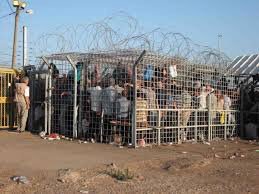
This is not a Nazi concentration camp!!
this is #Gaza under the Israeli occupation !!
The biggest prison in the world .. Gaza!: image via mohammed mosleh @MohammadMusle16, 17 April 2018
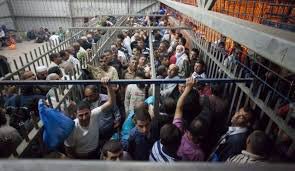
This is not a Nazi concentration camp!! this is #Gaza under the Israeli occupation !! The biggest prison in the world .. Gaza!: image via mohammed mosleh @MohammadMusle16, 17 April 2018
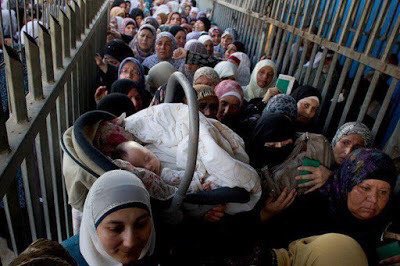
This is not a Nazi concentration camp!! this is #Gaza under the Israeli occupation !! The biggest prison in the world .. Gaza!: image via mohammed mosleh @MohammadMusle16, 17 April 2018
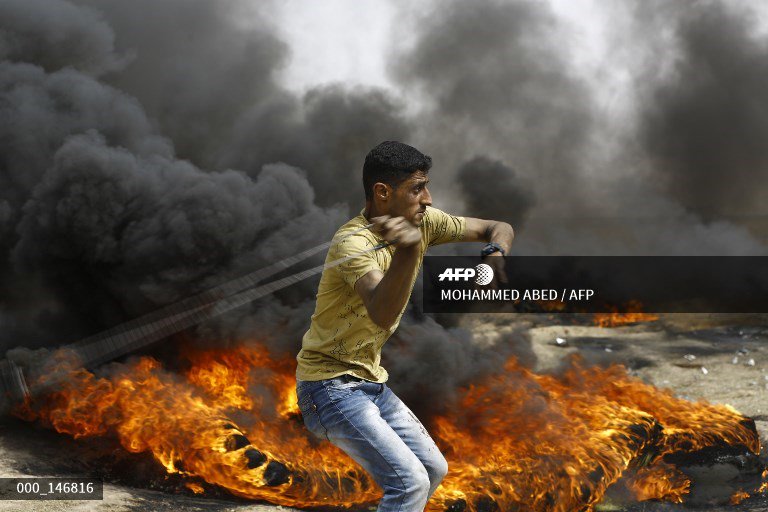
Two killed as more protests, clashes erupt on Gaza border #AFP: image via AFP Photo @AFPphoto, 20 April 2018
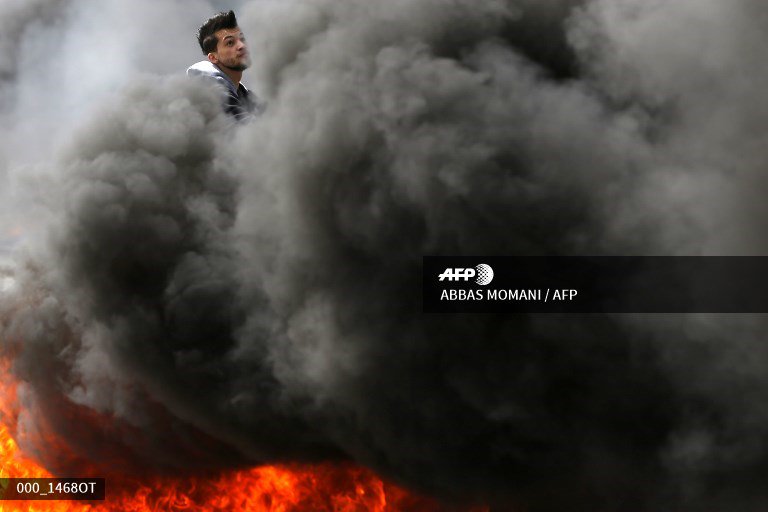
Two killed as more protests, clashes erupt on Gaza border #AFP: image via AFP Photo @AFPphoto, 20 April 2018
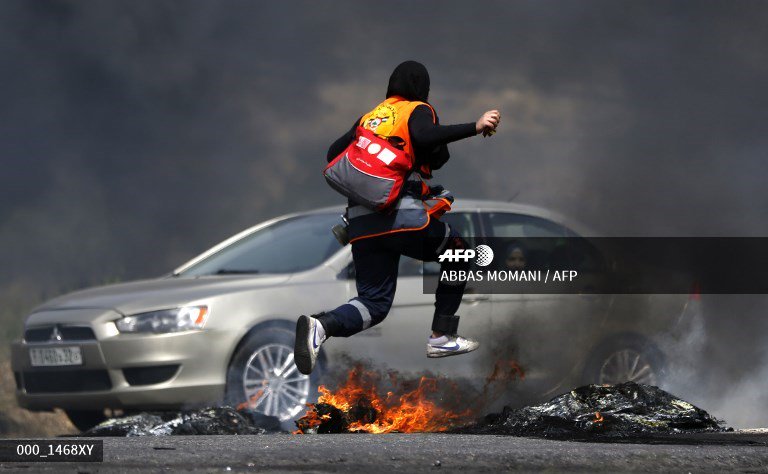
Two killed as more protests, clashes erupt on Gaza border #AFP: image via AFP Photo @AFPphoto, 20 April 2018
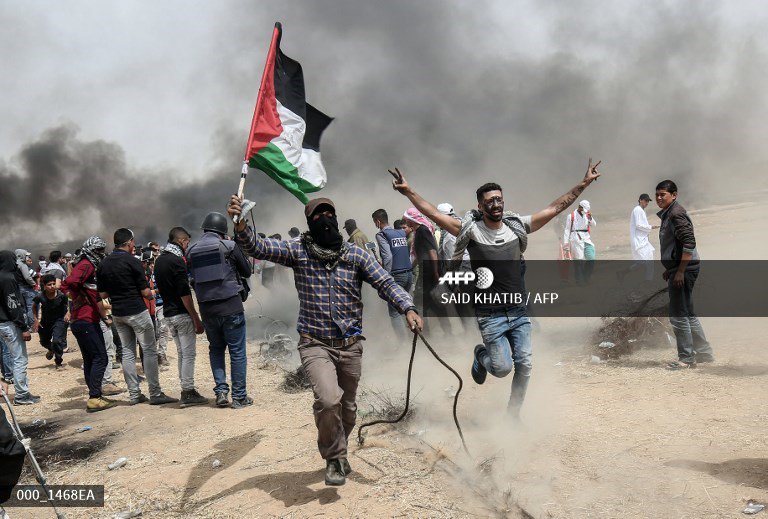
Two killed as more protests, clashes erupt on Gaza border #AFP: image via AFP Photo @AFPphoto, 20 April 2018
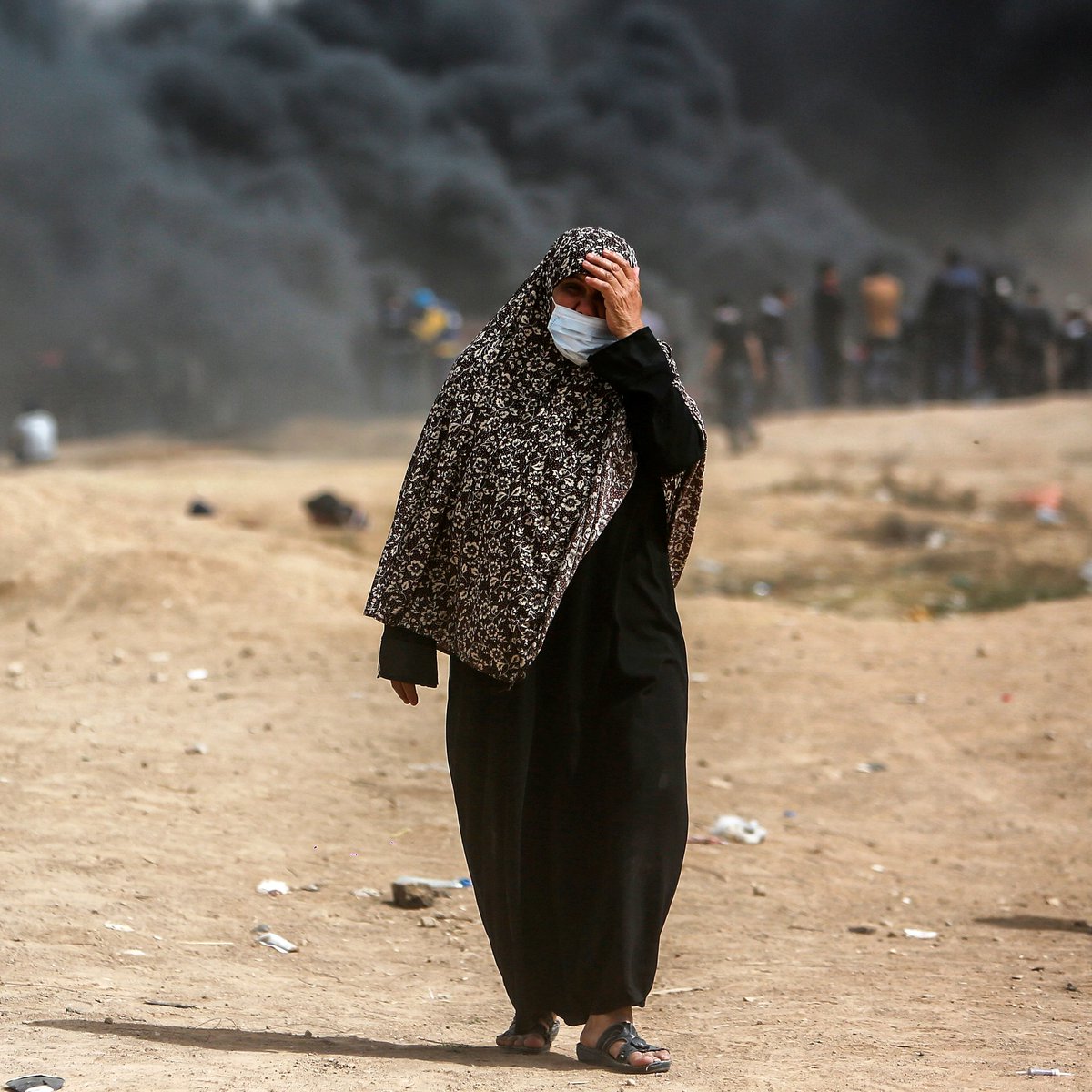
Palestinians march near #Gaza's border with #Israel in a major demonstration. APRIL 20, 2018. by Hosam Salem: image via HosamSalem @HosamSalemG, 20 April 2018
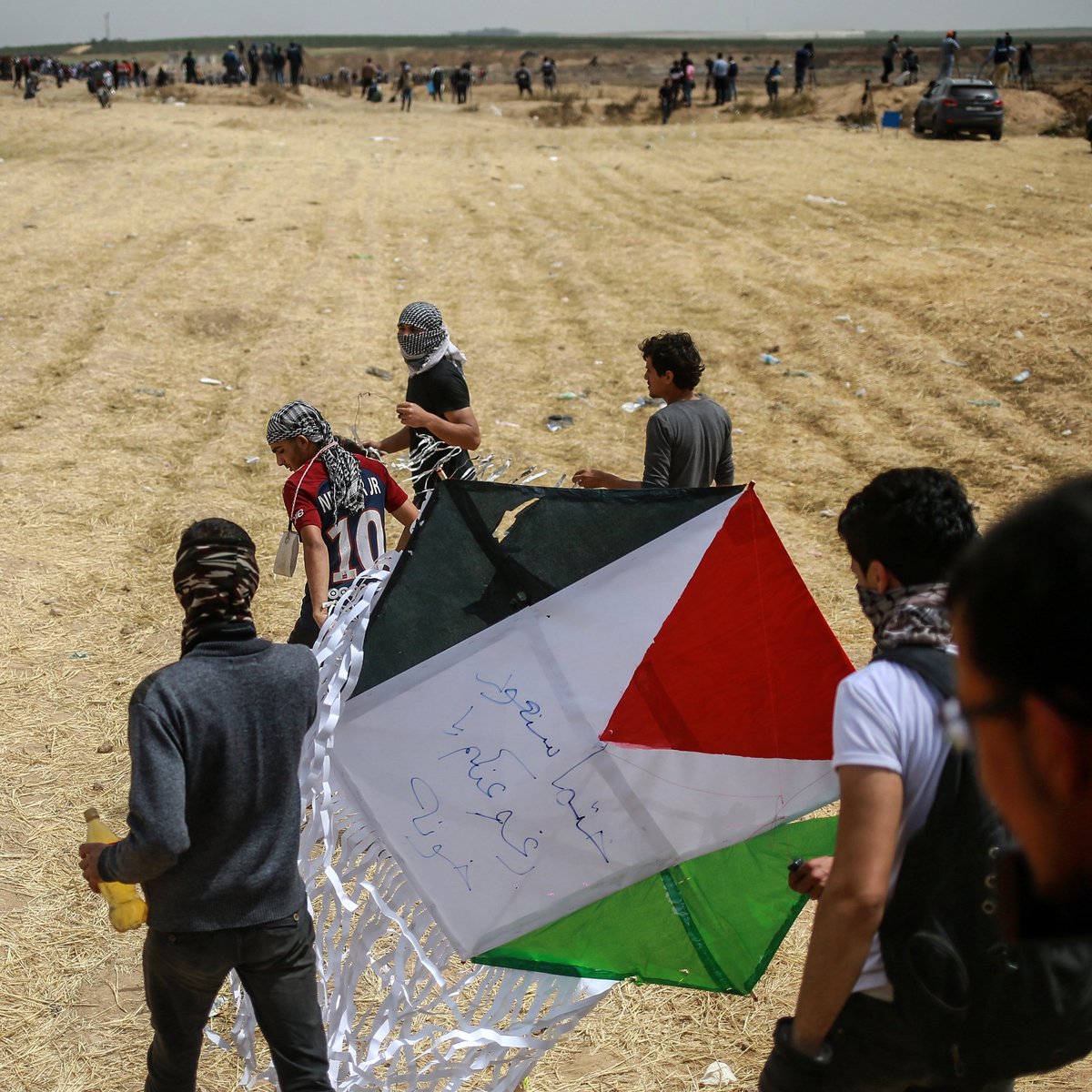
Palestinians march near #Gaza's border with #Israel in a major demonstration. APRIL 20, 2018. by Hosam Salem: image via HosamSalem @HosamSalemG, 20 April 2018
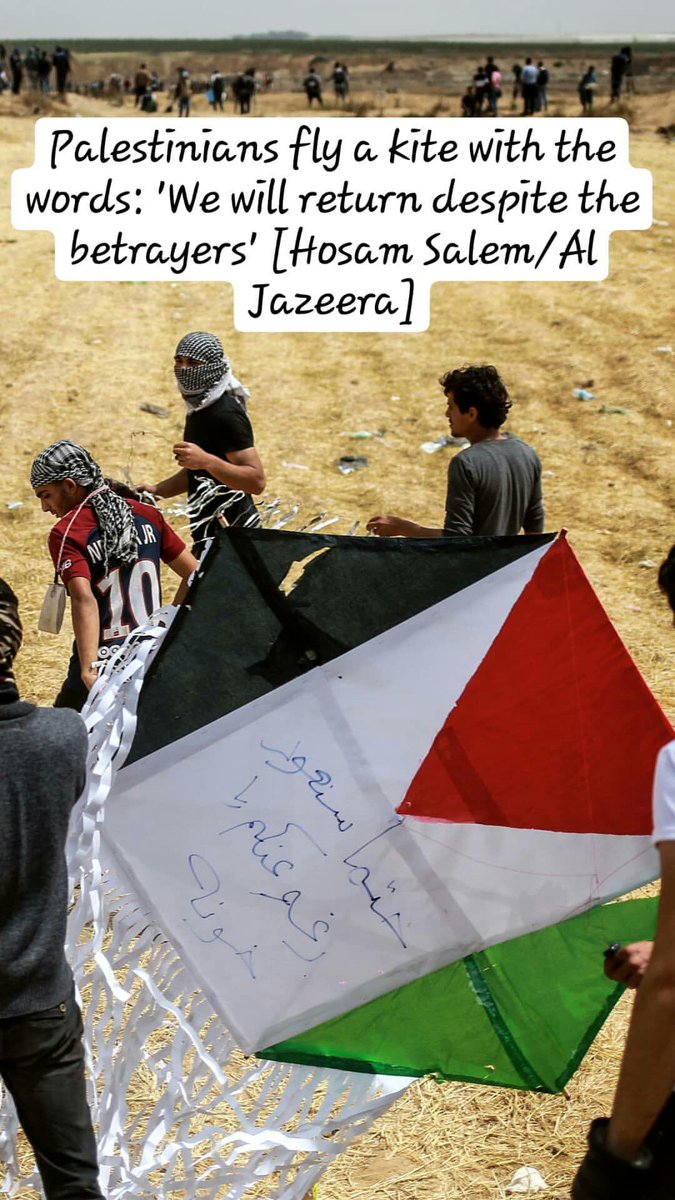
Palestinians march near #Gaza's border with #Israel in a major demonstration. APRIL 20, 2018. by Hosam Salem: image via HosamSalem @HosamSalemG, 20 April 2018
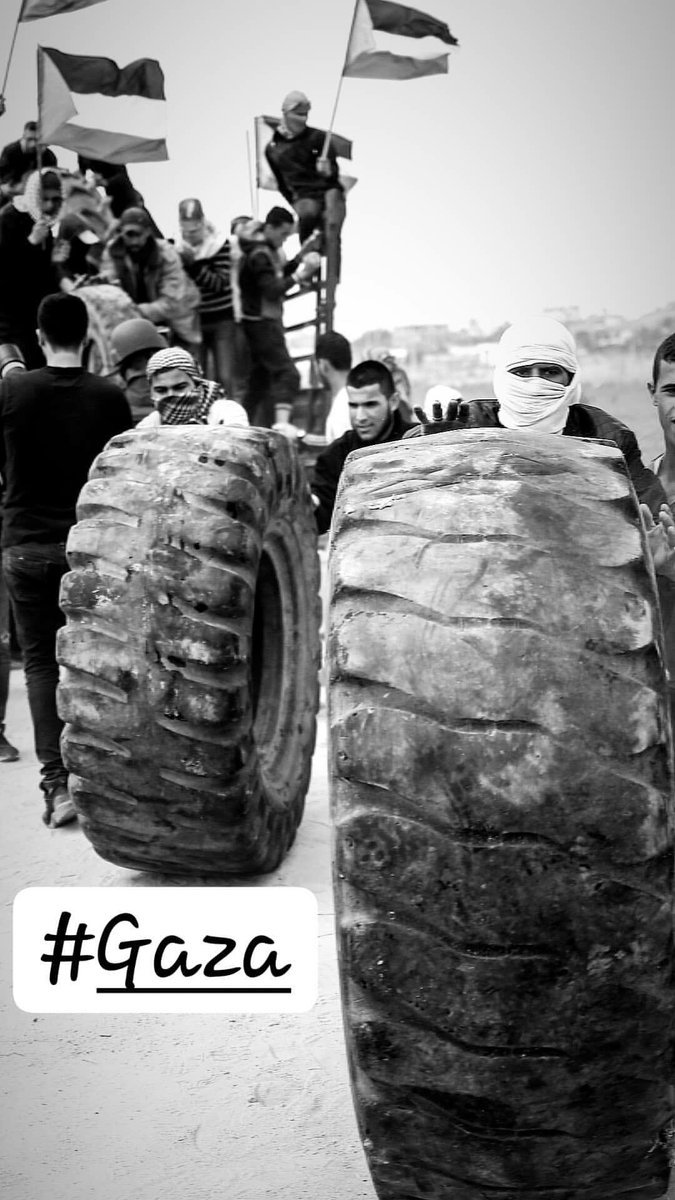
Palestinians march near #Gaza's border with #Israel in a major demonstration. APRIL 20, 2018. by Hosam Salem: image via HosamSalem @HosamSalemG, 20 April 2018
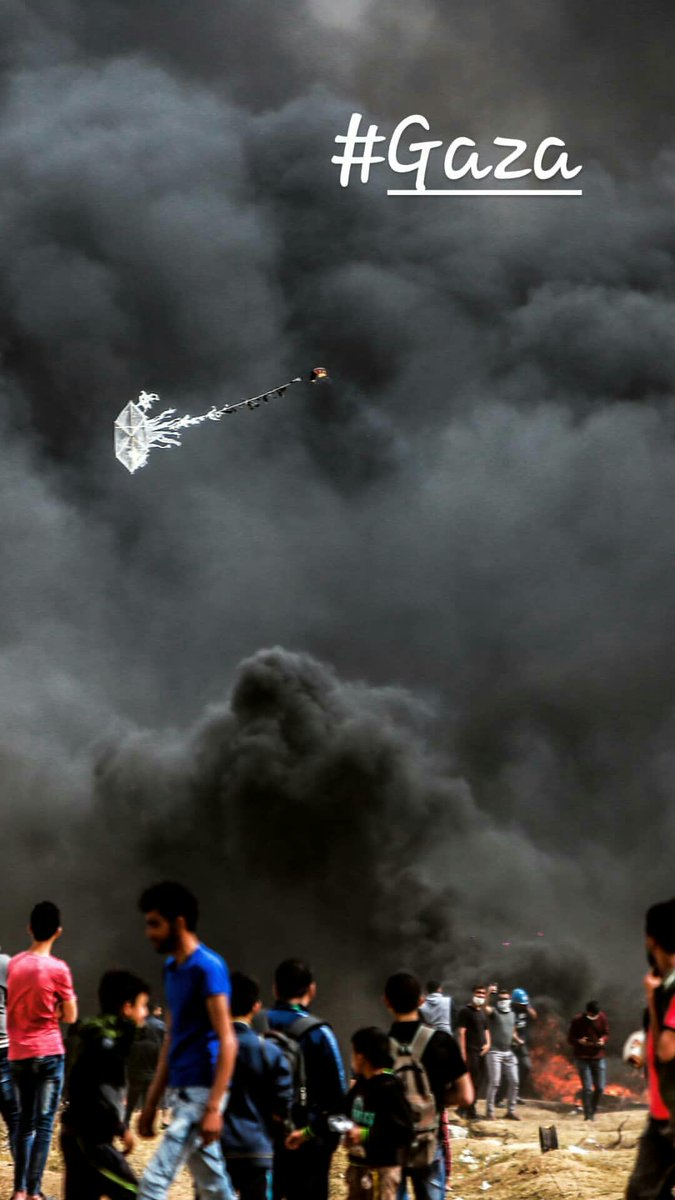
Palestinians march near #Gaza's border with #Israel in a major demonstration. APRIL 20, 2018. by Hosam Salem: image via HosamSalem @HosamSalemG, 20 April 2018
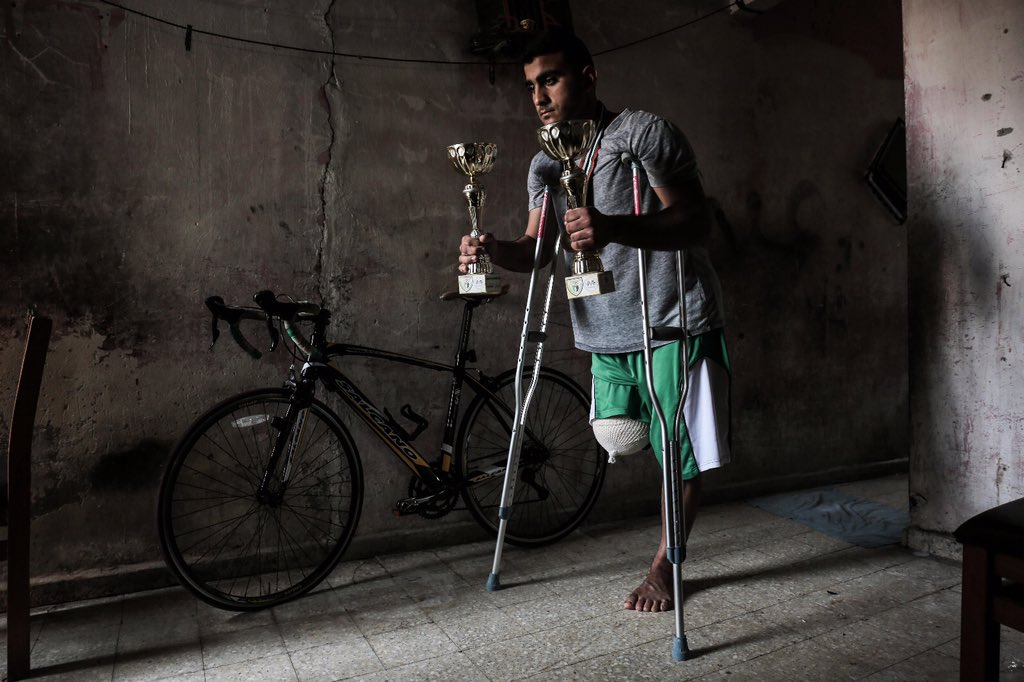
#Palestinian #cyclist Alaa Al-Daly, 21, who lost a leg by a bullet fired by #Israeli troops along the #Gaza #border, during a #protest, stands next to his #bicycle holding trophies he has won in competitions, at his home in #Rafah in the southern Gaza Strip. Daly's #dream: image via said khatib @saidkhatib, 20 April 2018
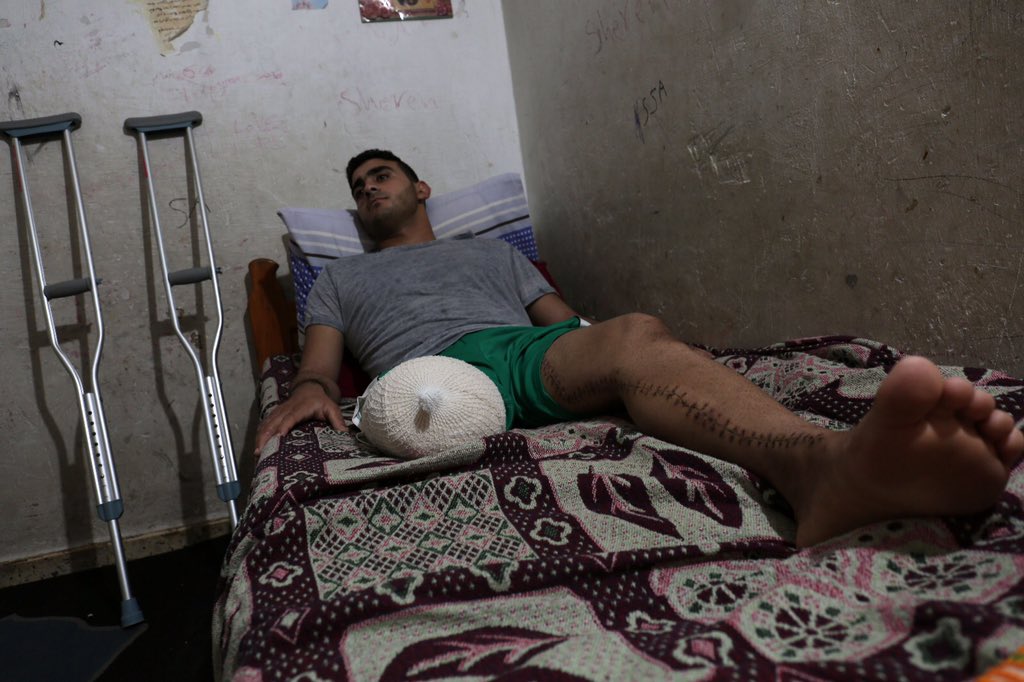
#Palestinian #cyclist Alaa Al-Daly, 21, who lost a leg by a bullet fired by #Israeli troops along the #Gaza #border, during a #protest, at his home in #Rafah in the southern Gaza Strip. Daly's #dream: image via said khatib @saidkhatib, 20 April 2018
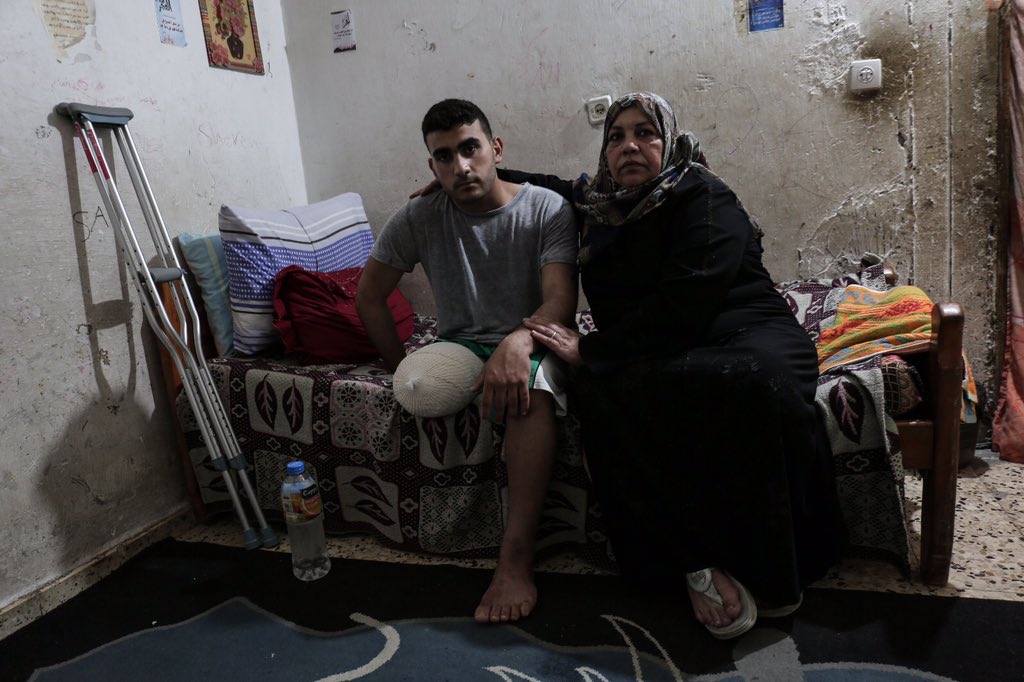
#Palestinian #cyclist Alaa Al-Daly, 21, who lost a leg by a bullet fired by #Israeli troops along the #Gaza #border, during a #protest, at his home in #Rafah in the southern Gaza Strip. Daly's #dream: image via said khatib @saidkhatib, 20 April 2018
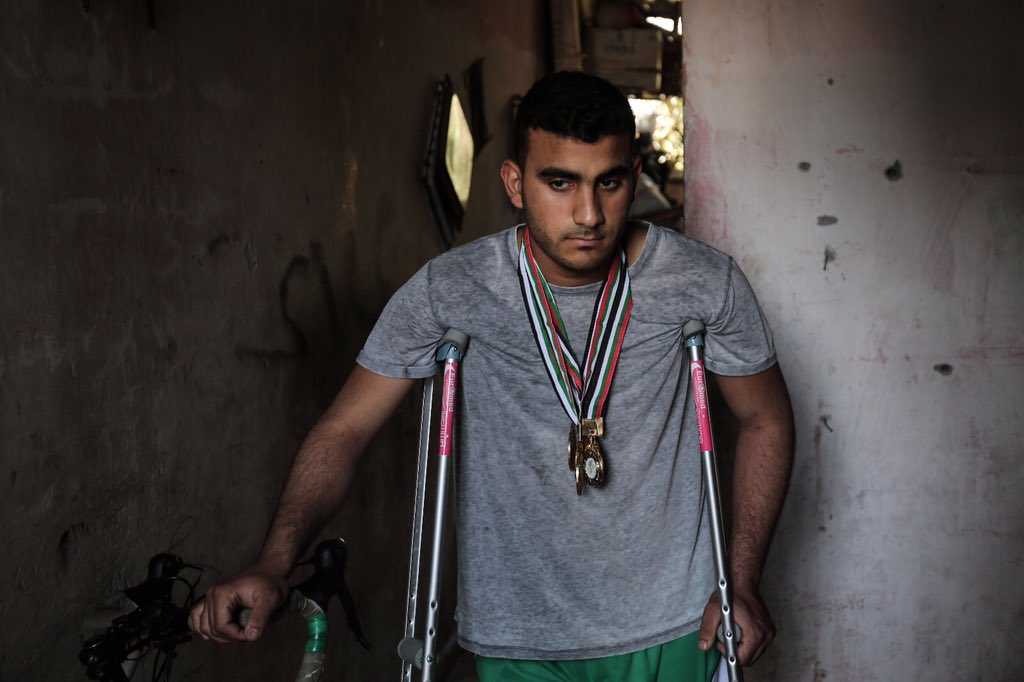
#Palestinian #cyclist Alaa Al-Daly, 21, who lost a leg by a bullet fired by #Israeli troops along the #Gaza #border, during a #protest, stands next to his #bicycle holding trophies he has won in competitions, at his home in #Rafah in the southern Gaza Strip. Daly's #dream: image via said khatib @saidkhatib, 20 April 2018
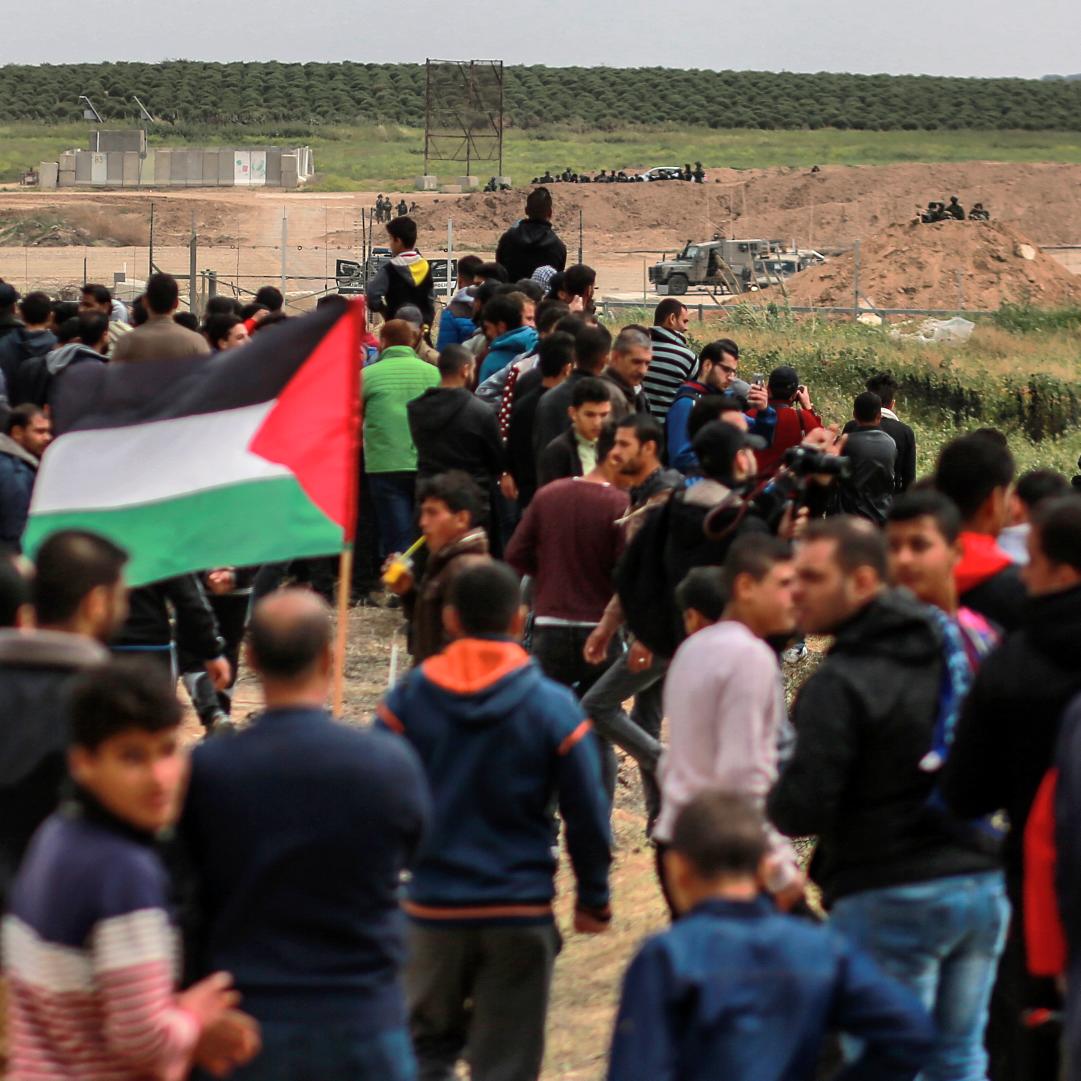
Israeli soldiers seen in the distance across from the #Gaza border with #Israel, east of Gaza City. HOSAM SALEM: image via HosamSalem @HosamSalemG, 17 April 2018
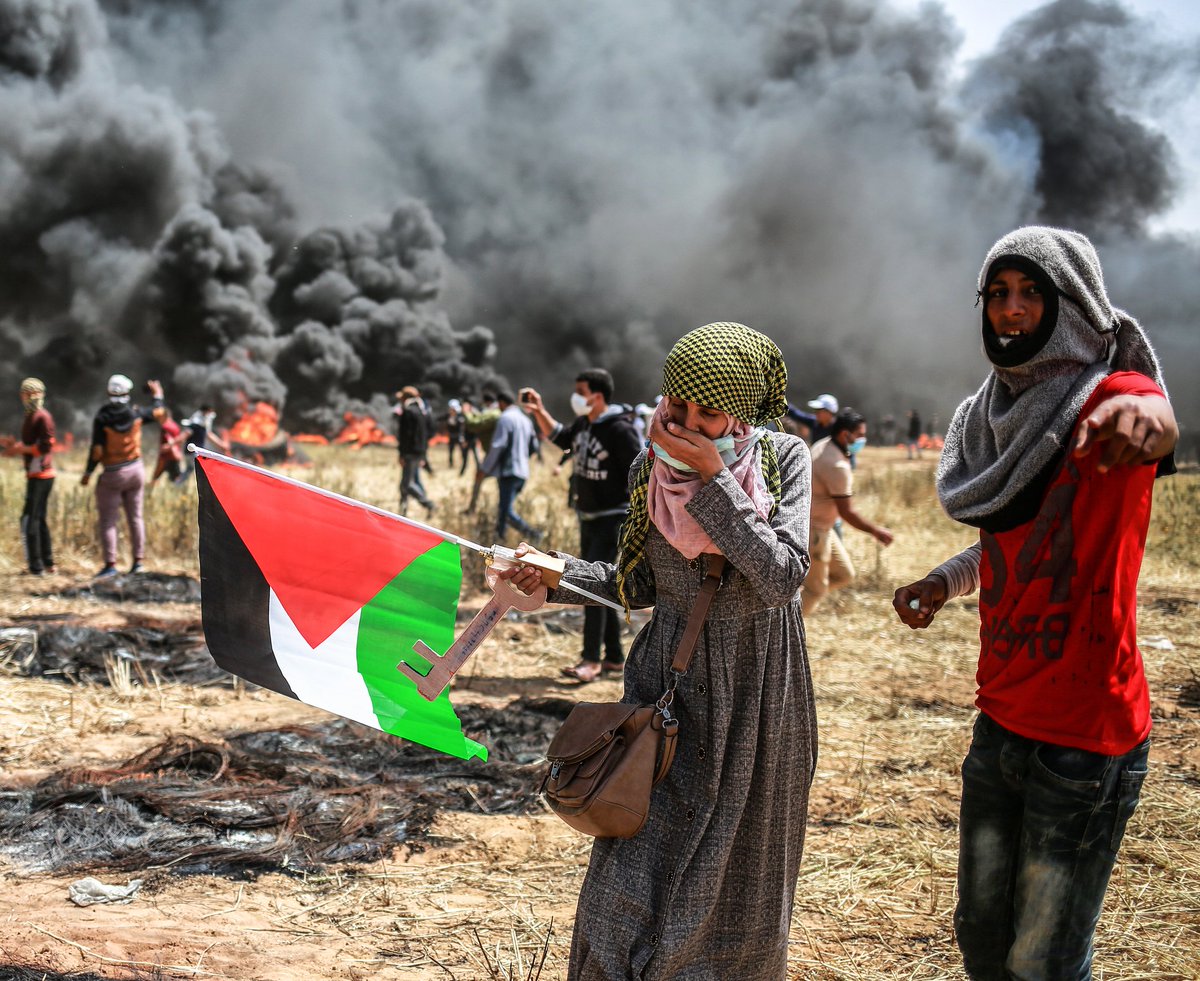
A Palestinian woman and man stand behind burning tyres in Khuza'a near the border in southern Gaza Strip [Hosam Salem/Al Jazeera]: image via HosamSalem @HosamSalemG, 16 April 2018
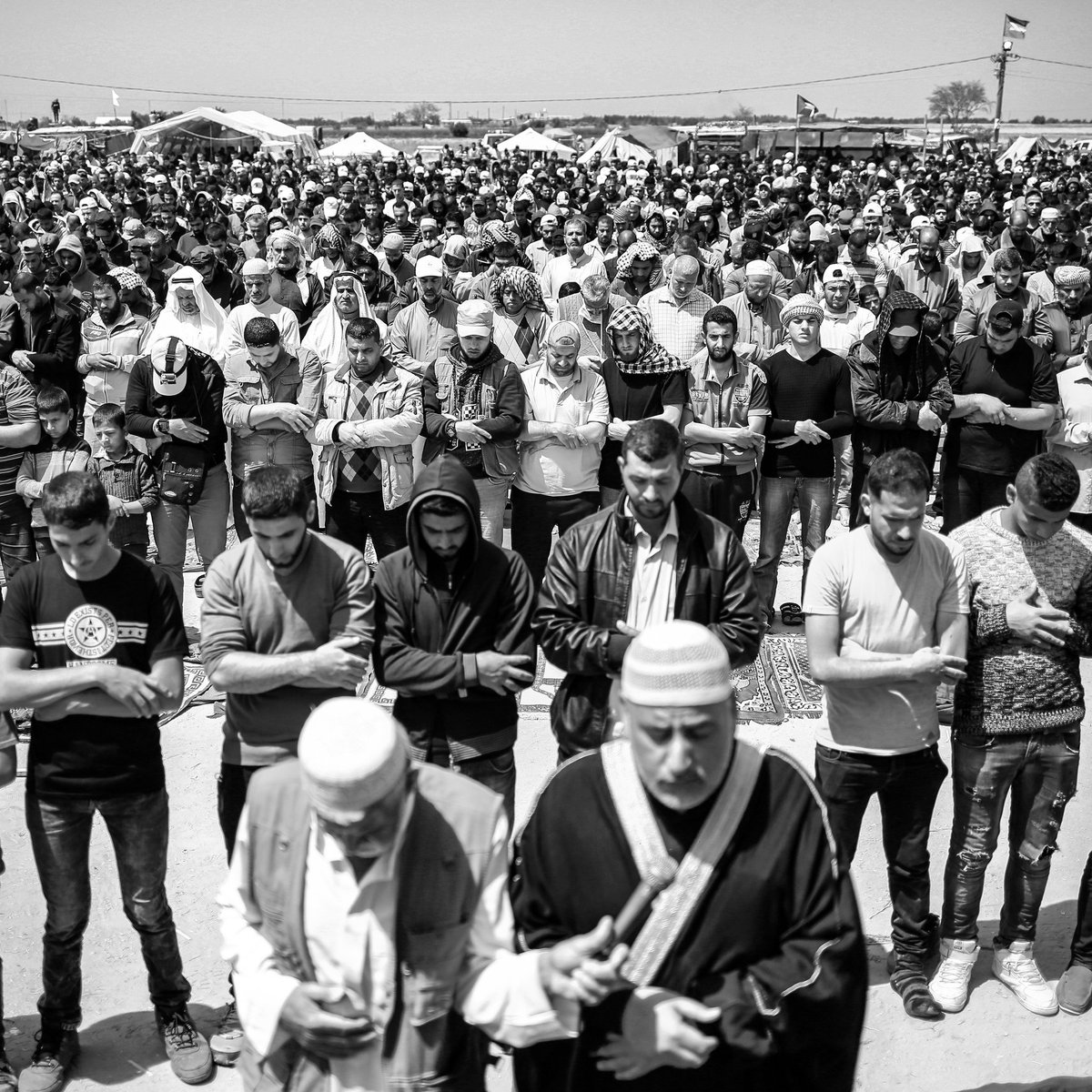
Palestinians pray during demonstration near the border in southern #Gaza Strip. April, 2018. By: Hosam Salem: image via HosamSalem @HosamSalemG, 15 April 2018
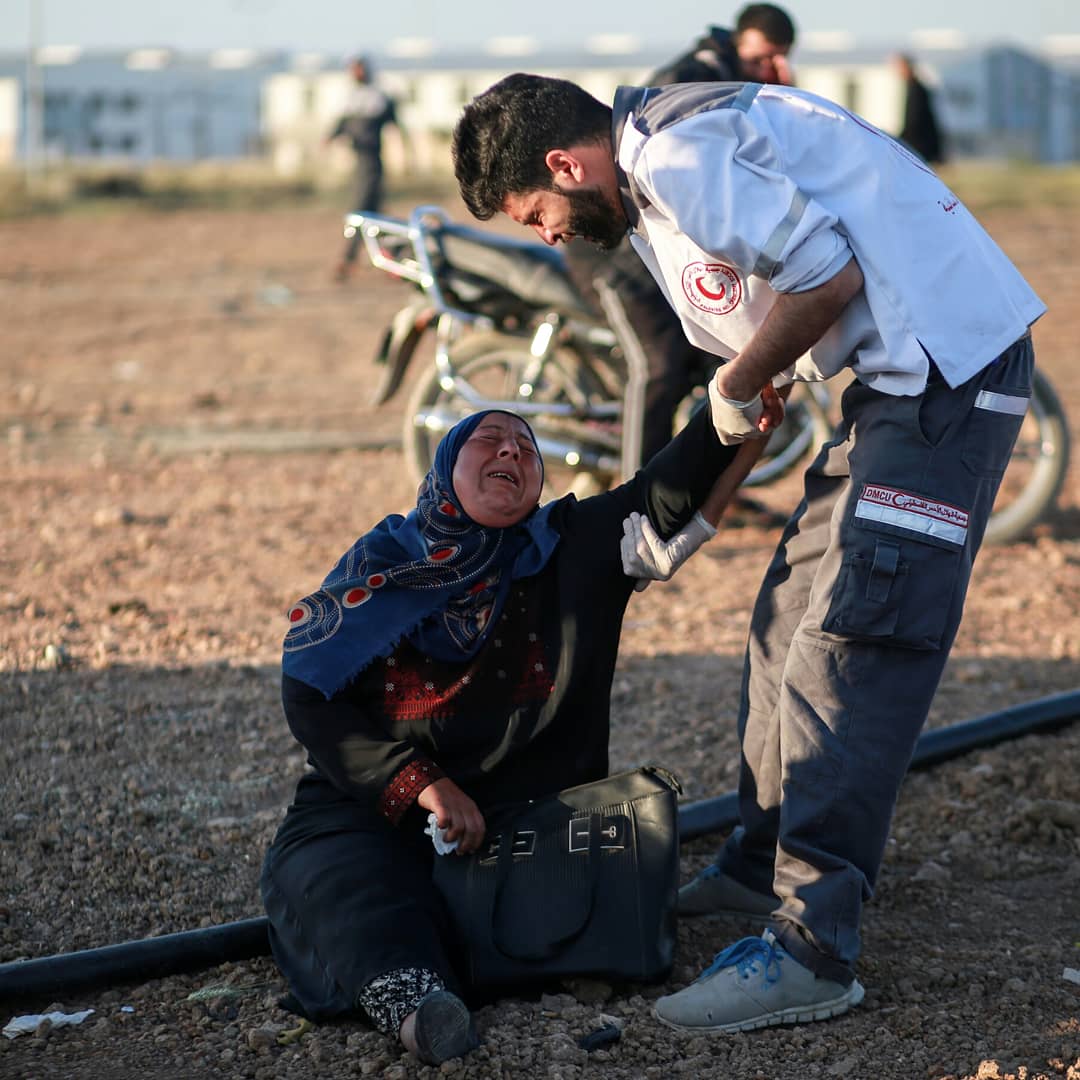
A Palestinian woman takes part in demonstration near the border in southern #Gaza Strip. April, 2018. By: Hosam Salem: image via HosamSalem @HosamSalemG, 15 April 2018
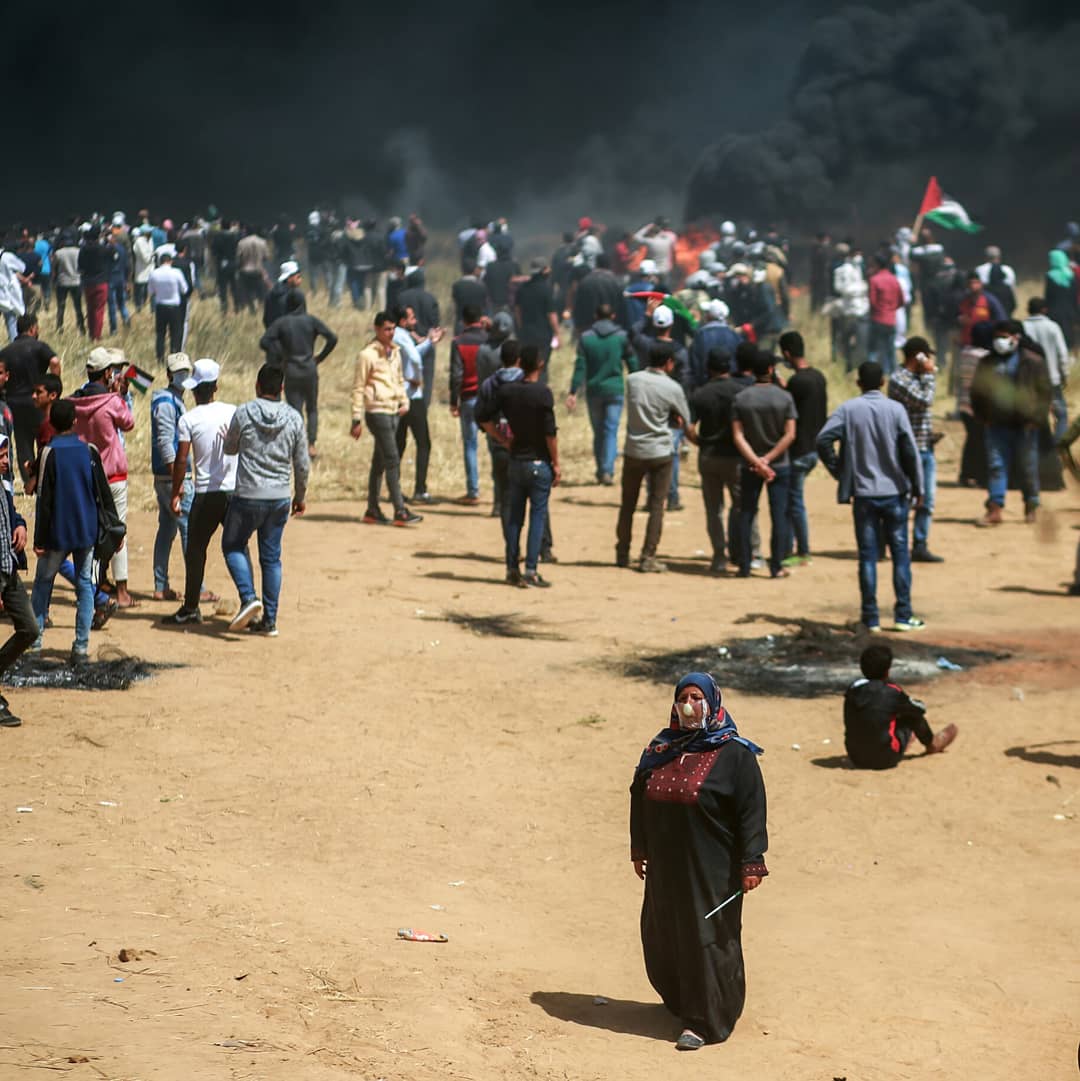
A Palestinian woman takes part in demonstration near the border in southern #Gaza Strip. April, 2018. By: Hosam Salem: image via HosamSalem @HosamSalemG, 15 April 2018
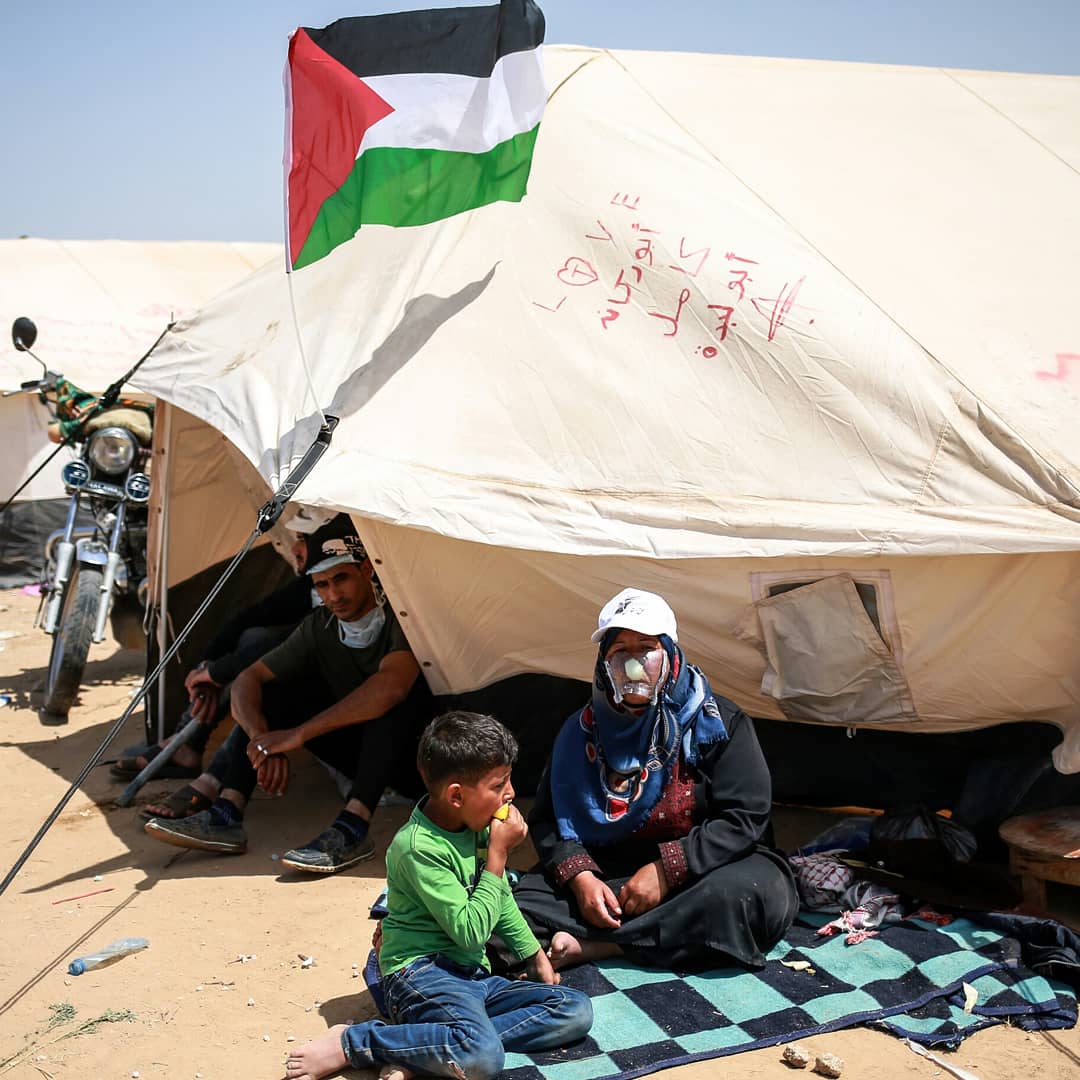
A Palestinian woman takes part in demonstration near the border in southern #Gaza Strip. April, 2018. By: Hosam Salem: image via HosamSalem @HosamSalemG, 15 April 2018
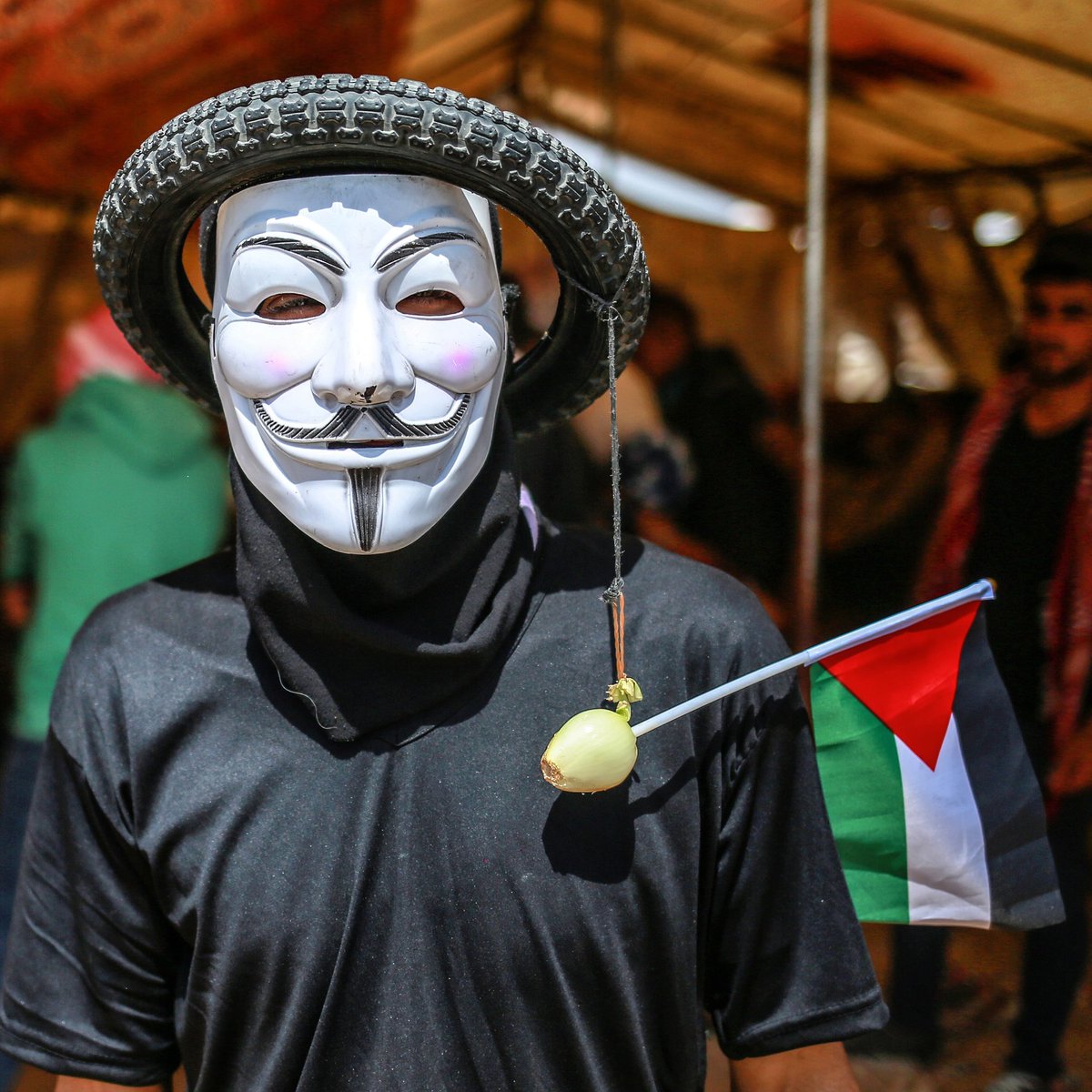
A Palestinian
protester wears a tyre on his head with an onion (to protect himself
from tear gas) dangling from it [Hosam Salem/Al Jazeera] #Gaza : image via HosamSalem @HosamSalemG, 13 April 2018
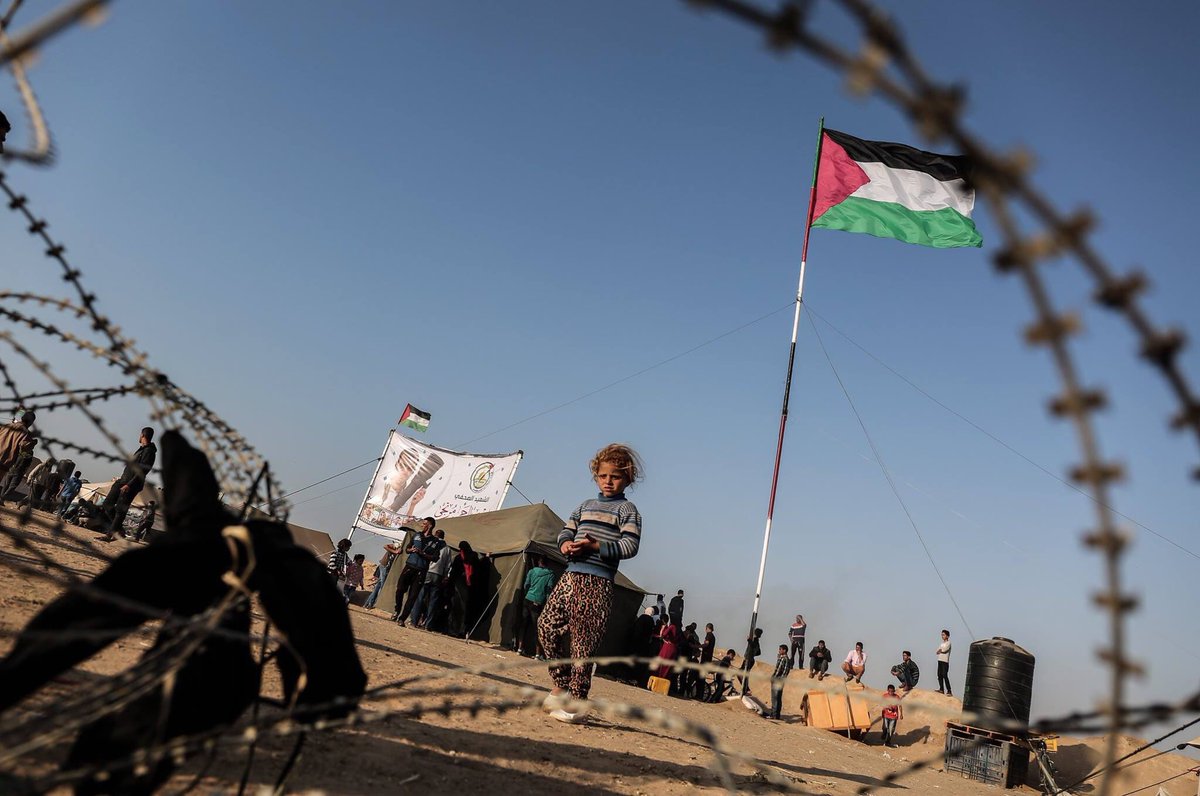
A #Palestinian girl walks near tents erected in protest near the border with #Israel, east of Khan Yunis in the southern Gaza strip #AFP: image via said khatib @saidkhatib, 15 April 2018
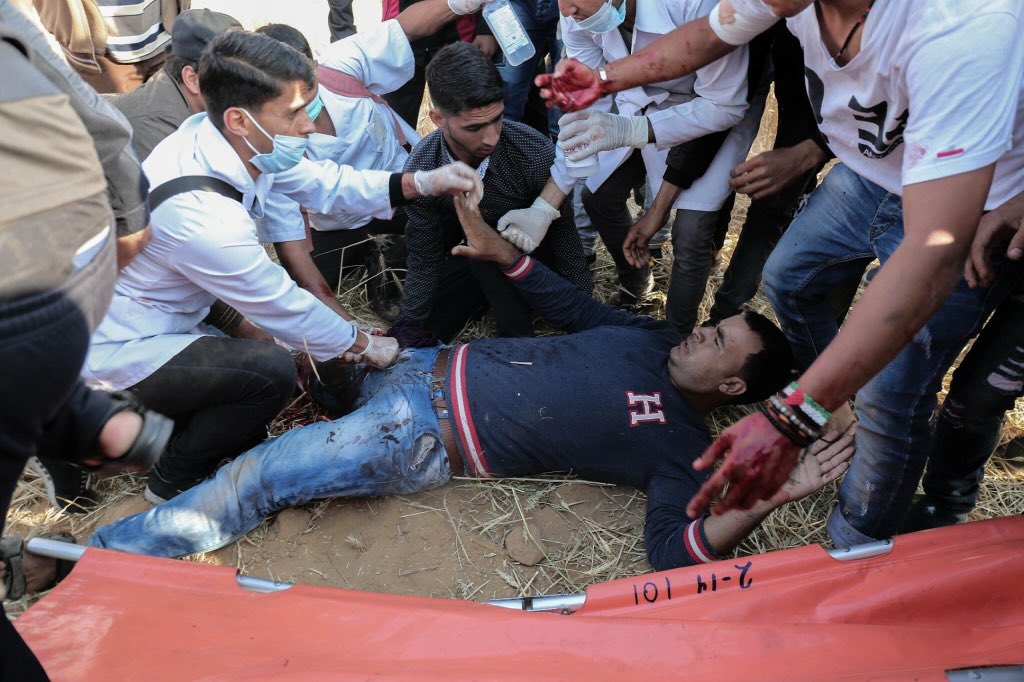
#Palestinian protestors face #Israeli soldiers near the #border fence with #Israel, east of Khan Yunis in the southern Gaza strip #AFP: image via said khatib @saidkhatib, 15 April 2018
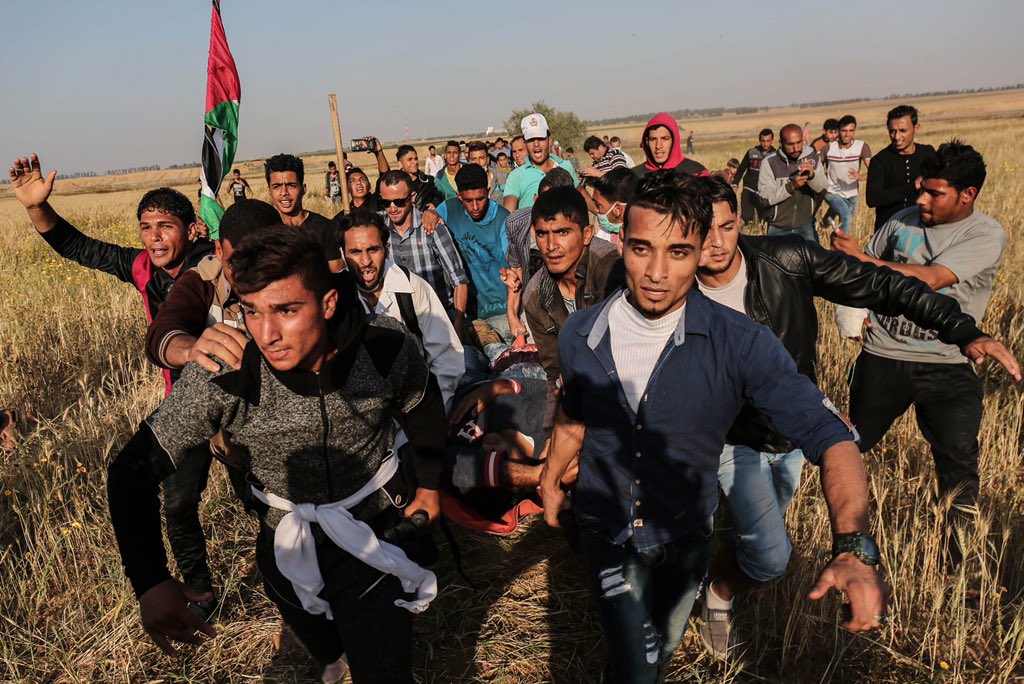
#Palestinian protestors face #Israeli soldiers near the #border fence with #Israel, east of Khan Yunis in the southern Gaza strip #AFP: image via said khatib @saidkhatib, 15 April 2018
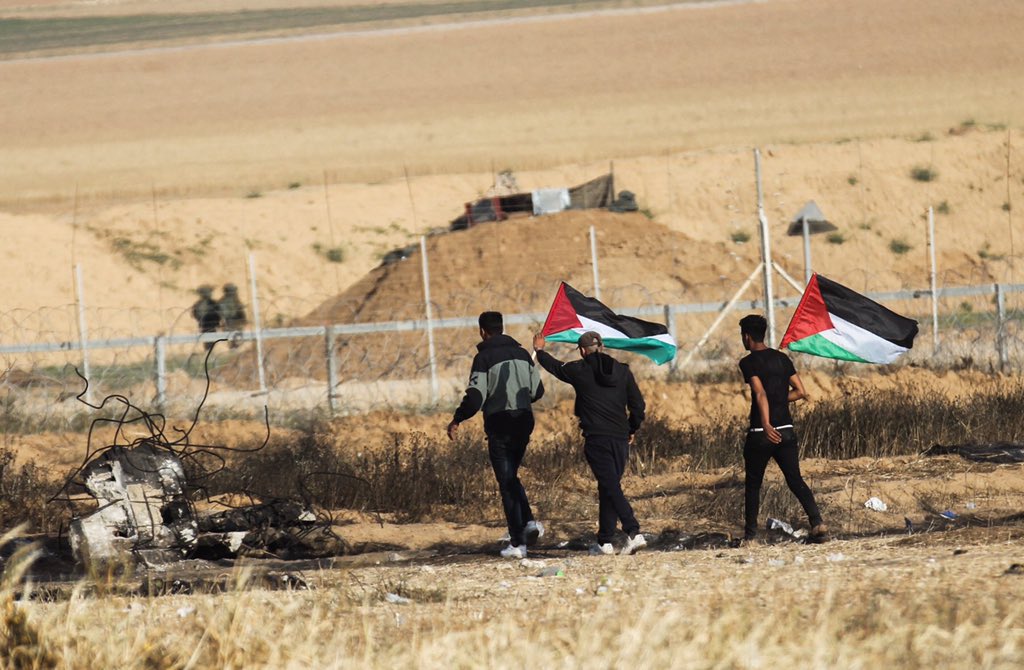
#Palestinian protestors face #Israeli soldiers near the #border fence with #Israel, east of Khan Yunis in the southern Gaza strip #AFP: image via said khatib @saidkhatib, 15 April 2018
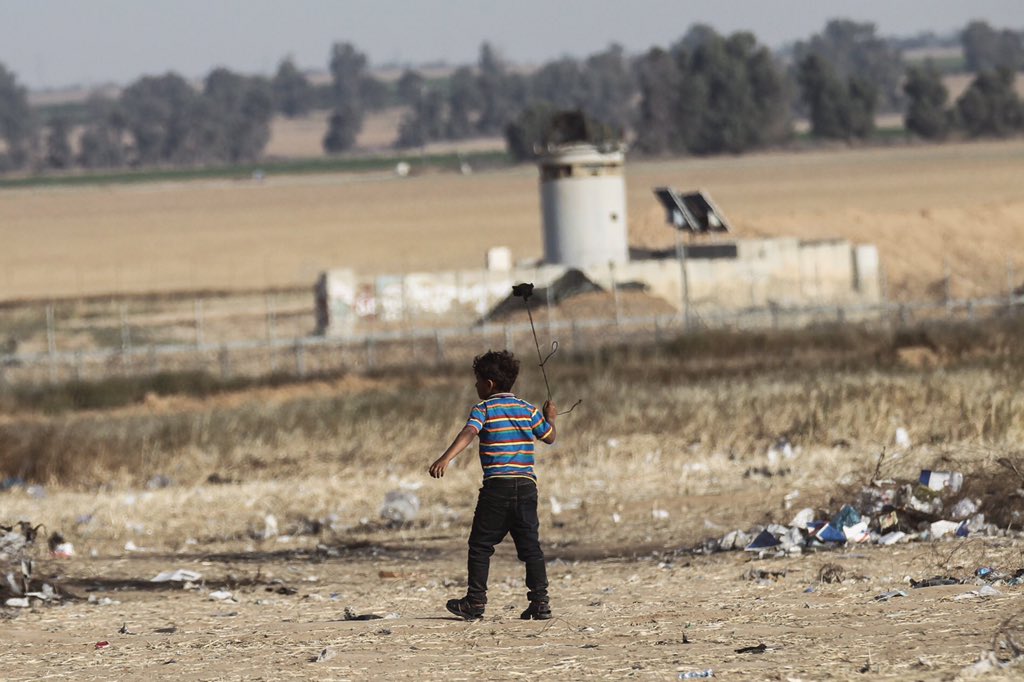
#Palestinian protestors face #Israeli soldiers near the #border fence with #Israel, east of Khan Yunis in the southern Gaza strip #AFP: image via said khatib @saidkhatib, 15 April 2018
Mahmoud Darwish: Silence for Gaza
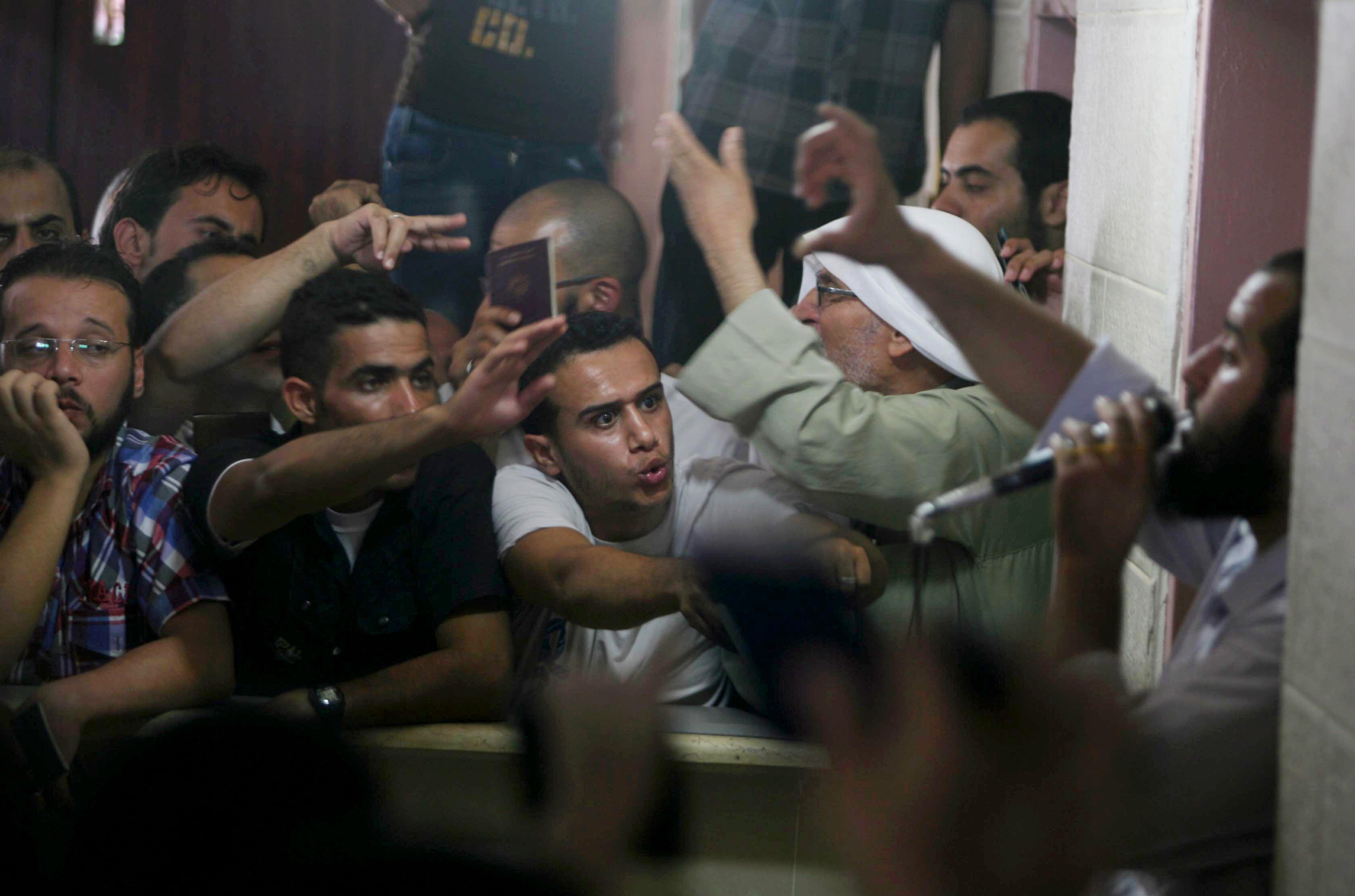
Palestinians at Rafah crossing await permission to transport people wounded in the ongoing offensive against the Gaza Strip to Egypt for treatment: photo by Eyad Al Baba / APA Images, 12 July 2014

Palestinians at Rafah crossing await permission to transport people wounded in the ongoing offensive against the Gaza Strip to Egypt for treatment: photo by Eyad Al Baba / APA Images, 12 July 2014
Gaza is far from its relatives and close to its enemies, because
whenever Gaza explodes, it becomes an island and it never stops
exploding. It scratched the enemy’s face, broke his dreams and stopped
his satisfaction with time.
Because in Gaza time is something different.
Because in Gaza time is not a neutral element.
It does not compel people to cool contemplation, but rather to explosion and a collision with reality.
Time there does not take children from childhood to old age, but rather makes them men in their first confrontation with the enemy.
Time in Gaza is not relaxation, but storming the burning noon. Because in Gaza values are different, different, different.
The only value for the occupied is the extent of his resistance to occupation.
That is the only competition there. Gaza has been addicted to knowing this cruel, noble value. It did not learn it from books, hasty school seminars, loud propaganda megaphones, or songs. It learned it through experience alone and through work that is not done for advertisement and image.
Gaza has no throat. Its pores are the ones that speak in sweat, blood, and fires. Hence the enemy hates it to death and fears it to criminality, and tries to sink it into the sea, the desert, or blood. And hence its relatives and friends love it with a coyness that amounts to jealousy and fear at times, because Gaza is the brutal lesson and the shining example for enemies and friends alike.
Gaza is not the most beautiful city.
Its shore is not bluer than the shores of Arab cities.
Its oranges are not the most beautiful in the Mediterranean basin.
Gaza is not the richest city.
It is not the most elegant or the biggest, but it equals the history of an entire homeland, because it is more ugly, impoverished, miserable, and vicious in the eyes of enemies. Because it is the most capable, among us, of disturbing the enemy’s mood and his comfort. Because it is his nightmare. Because it is mined oranges, children without a childhood, old men without old age and women without desires. Because of all this it is the most beautiful, the purest and richest among us and the one most worthy of love.
We do injustice to Gaza when we look for its poems, so let us not disfigure Gaza’s beauty. What is most beautiful in it is that it is devoid of poetry at a time when we tried to triumph over the enemy with poems, so we believed ourselves and were overjoyed to see the enemy letting us sing. We let him triumph, then when we dried our lips of poems we saw that the enemy had finished building cities, forts and streets. We do injustice to Gaza when we turn it into a myth, because we will hate it when we discover that it is no more than a small poor city that resists.
We do injustice when we wonder: What made it into a myth? If we had dignity, we would break all our mirrors and cry or curse it if we refuse to revolt against ourselves. We do injustice to Gaza if we glorify it, because being enchanted by it will take us to the edge of waiting and Gaza doesn’t come to us. Gaza does not liberate us. Gaza has no horses, airplanes, magic wands, or offices in capital cities. Gaza liberates itself from our attributes and liberates our language from its Gazas at the same time. When we meet it -- in a dream -- perhaps it won’t recognize us, because Gaza was born out of fire, while we were born out of waiting and crying over abandoned homes.
It is true that Gaza has its special circumstances and its own revolutionary traditions. But its secret is not a mystery: Its resistance is popular and firmly joined together and knows what it wants (it wants to expel the enemy out of its clothes). The relationship of resistance to the people is that of skin to bones and not a teacher to students. Resistance in Gaza did not turn into a profession or an institution.
It did not accept anyone’s tutelage and did not leave its fate hinging on anyone’s signature or stamp.
It does not care that much if we know its name, picture, or eloquence. It did not believe that it was material for media. It did not prepare for cameras and did not put smiling paste on its face.
Neither does it want that, nor we.
Hence, Gaza is bad business for merchants and hence it is an incomparable moral treasure for Arabs.
What is beautiful about Gaza is that our voices do not reach it. Nothing distracts it; nothing takes its fist away from the enemy’s face. Not the forms of the Palestinian state we will establish whether on the eastern side of the moon, or the western side of Mars when it is explored. Gaza is devoted to rejection… hunger and rejection, thirst and rejection, displacement and rejection, torture and rejection, siege and rejection, death and rejection.
Enemies might triumph over Gaza (the storming sea might triumph over an island… they might chop down all its trees).
They might break its bones.
They might implant tanks on the insides of its children and women. They might throw it into the sea, sand, or blood.
But it will not repeat lies and say “Yes” to invaders.
It will continue to explode.
It is neither death, nor suicide. It is Gaza’s way of declaring that it deserves to live. It will continue to explode.
It is neither death, nor suicide. It is Gaza’s way of declaring that it deserves to live.
Mahmoud Darwish (1941-2008): Silence for Gaza, English version by Sinan Antoon, from Hayrat al-`A’id (The Returnee’s Perplexity), Riyad al-Rayyis, 2007
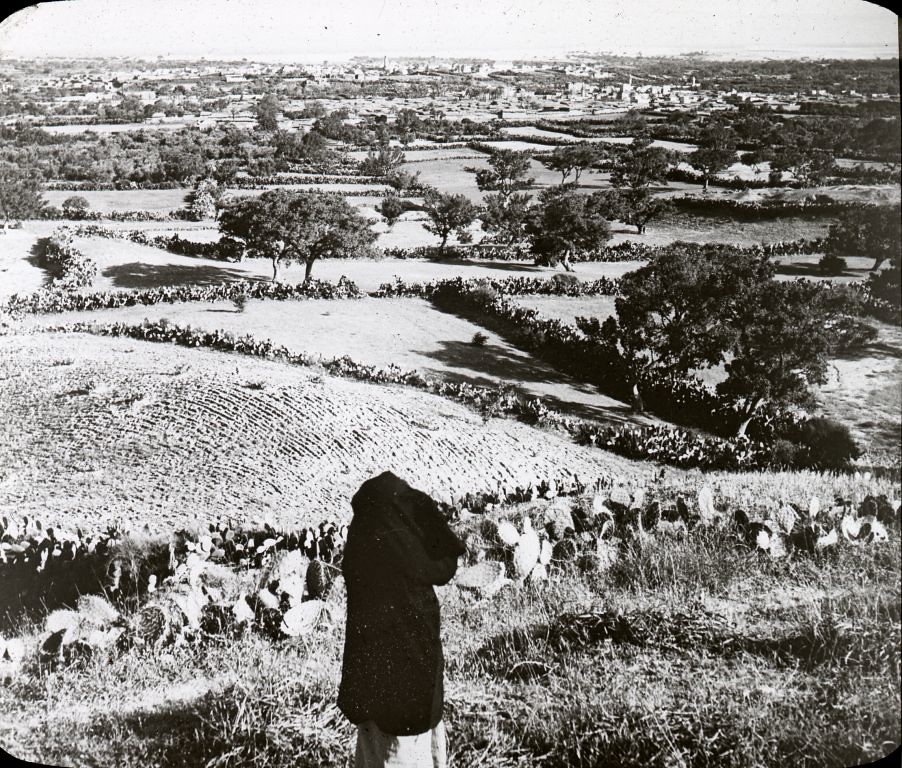
Gaza from the Hill Muntar. Image Description from historic lecture booklet: "This picture is taken two miles southwest of Gaza on the Hill Muntar. Gaza was the southern-most and strongest of five Royal Cities of Philistines. It has been made famous by the exploits of Samson. Tradition points out a place on the southwest side of town toward the left of the picture as the place where stood the gates of the Philistine city which Samson carried off (Judges 13). It is claimed by some that this is the hill whither Samson carried the gates. Gaza is about 100 feet high and stands in the midst of orchards. There is an abundance of figs, dates and olives. The soil is irrigated by well water and yields abundantly. Gaza is very closely connected with Old Testament history, being mentioned in almost every book. It was a town even before the call of Abraham, and now is the largest city close to the seacoast in Palestine. In the conquest of Joshua the territory of Gaza is mentioned as one which he was not able to subdue (Josh. 15:47). But it apparently continued through the times of Samuel, Saul, and David to be a Philistine city.": photographer unknown, c. 1910 (Oregon State University Special Collections and Archives)
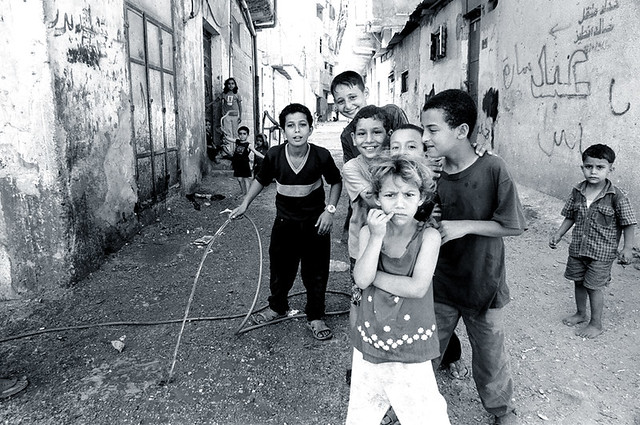
Kids in Gaza. Photographed near Jabaliya Refugee Camp. Drinking water is limited in the Strip, and I am not sure how clean this water was: photo by Shabtai Gold, July 2005; image by velvetart, 6 September 2005
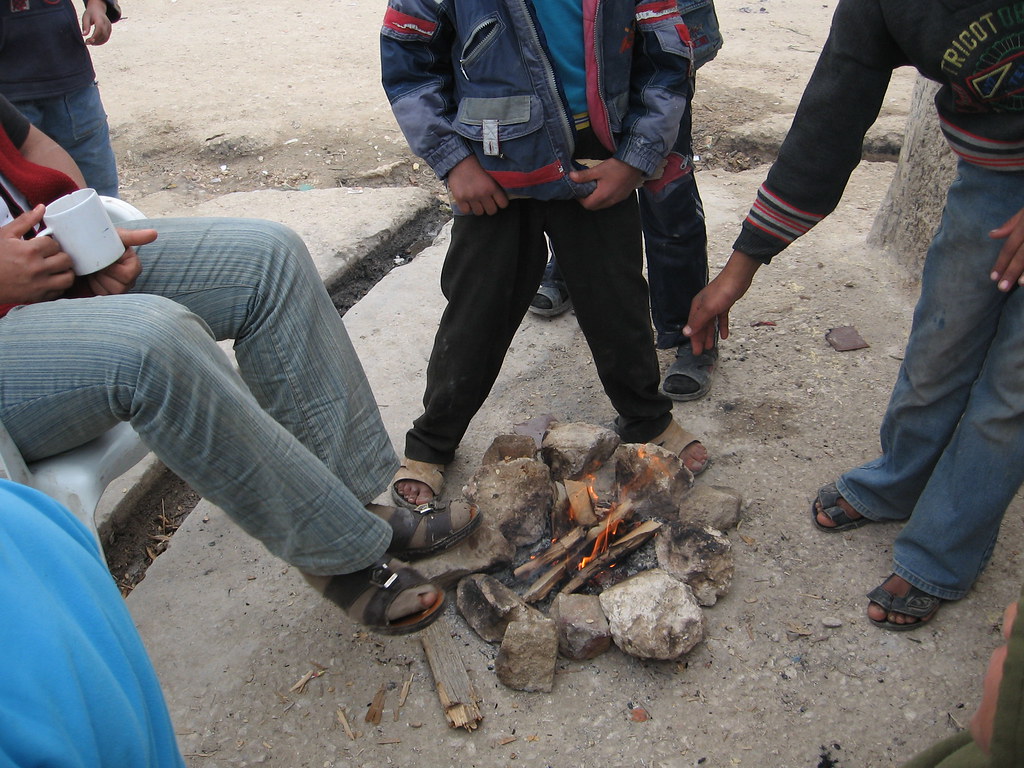
Palestinian children keeping warm during winter with "hatab" fire in Gaza refugee camp, Jerash, Jordan. In the Gaza refugee camp where most homes lack indoor plumbing and heating, the time-honored Arab tradition of gathering around a "hatab" fire is frequently practiced during the winter season. The youth who often complain of being cramped up in their small homes, are particularly fond of making outdoor fires with scrap wood and shrubs located throughout the camp: photo by Einkarem1948, 18 January 2009
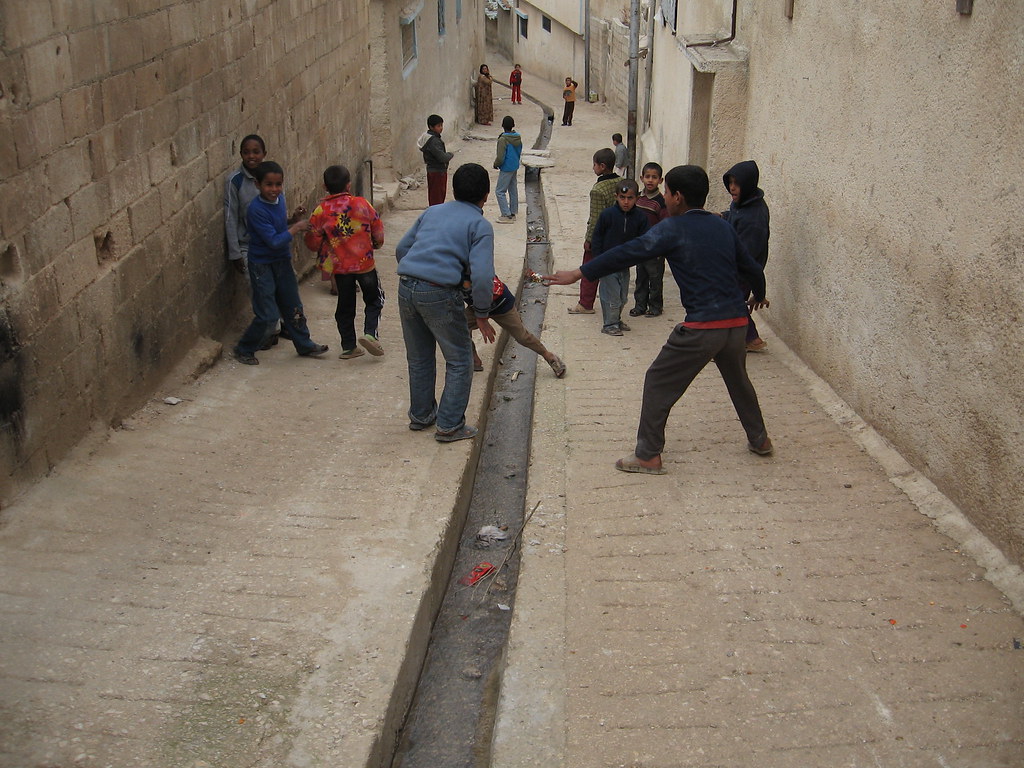
Children playing near overground sewage in Gaza refugee camp, Jerash, Jordan. Suffering and deprivation is apparent throughout the Gaza refugee camp where the vast majority of families live on less than $40 USD per month. The putrid odor from overground sewage, coupled with the dusty deserts surrounding the refugee camp make living a daily challenge for residents of the camp. Sewage and waste water accumulates in the overground sewage systems shown above. These sewage "lines" in the camp collect from holes in the floors of the homes or dumped directly into ditches that run beneath each home in the camp. Despite being plagued by severe poverty, residents of this refugee camp are regularly forced to pay Jordanian authorities exorbitant amounts to have the excreta/sewage pumped out of their homes into special septic tanks. The Gaza refugee camp in Jerash, Jordan is home to 24,000-34,000 Palestinian refugees who fled from Gaza, Palestine in 1948 and 1967. Unlike Palestinian refugees from other districts of Palestine, the Palestinians in the Gaza refugee camp are considered persona non grata in Jordan (i.e. they are denied an identity, not granted identification papers and, therefore, denied the right to work and travel freely throughout the country). Most Jordanians and Palestinians living in the capital of Amman remain unaware of the Palestinians in the Gaza refugee camp, prompting many experts to describe these refugees as the "Forgotten Ones": photo by Einkarem1948, 18 January 2009
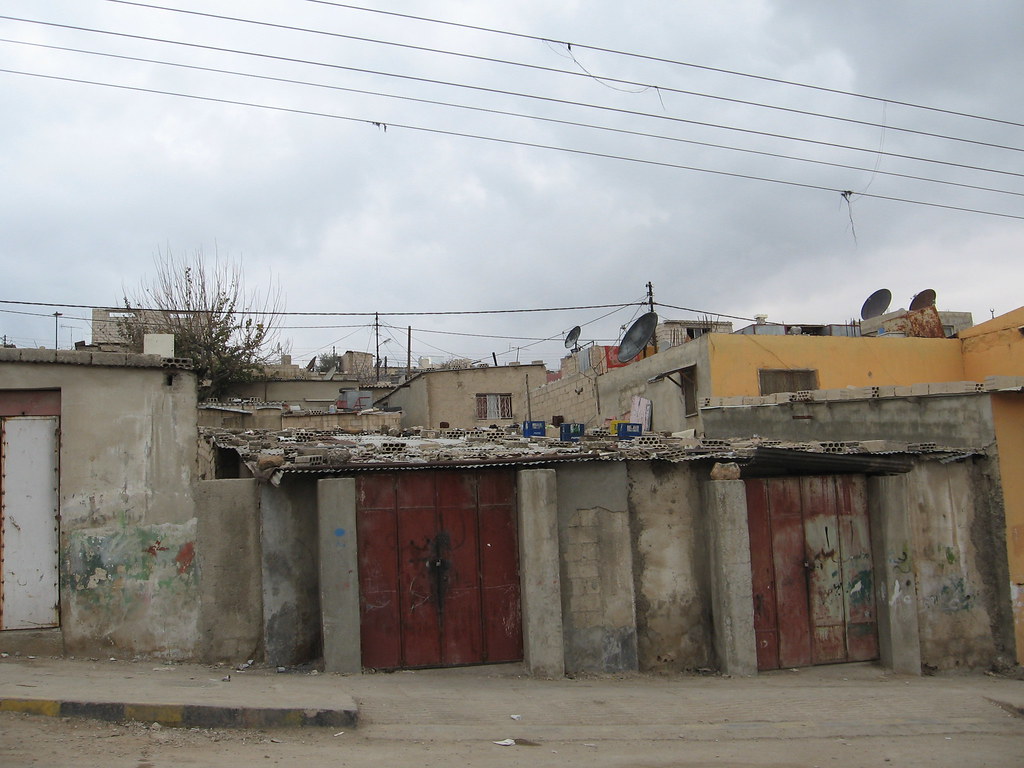
Typical homes in Gaza refugee camp, Jerash, Jordan: photo by Einkarem1948, 18 January 2009
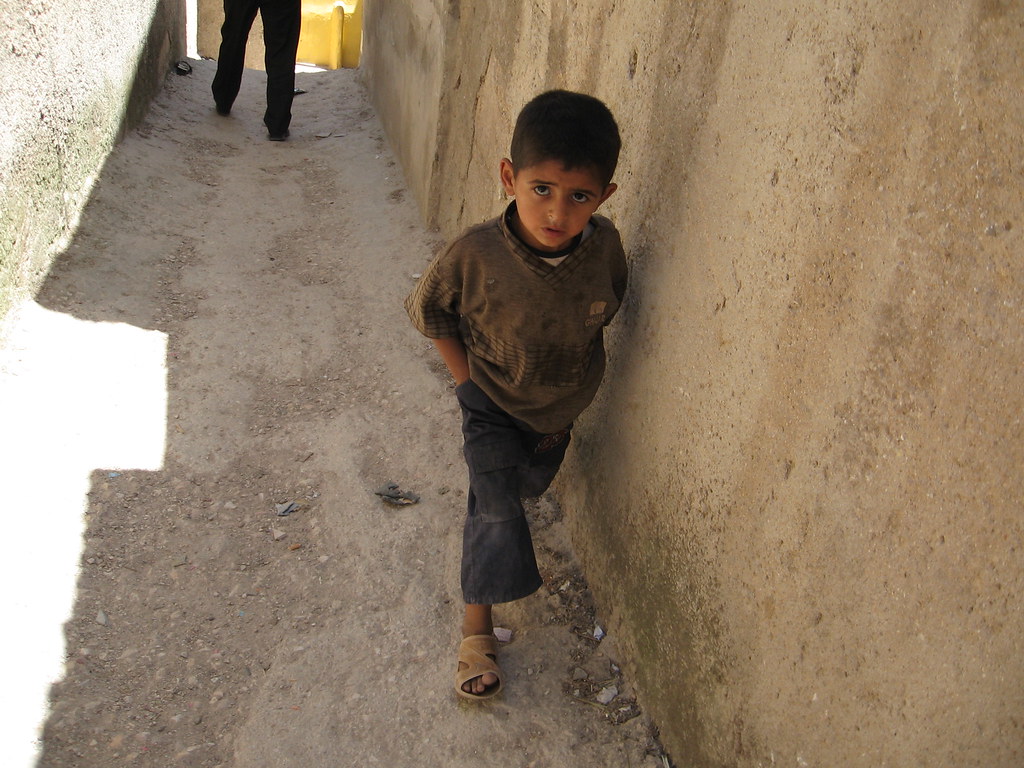
Narrow alley in the Gaza refugee camp: photo by Einkarem1948, 10 June 2009
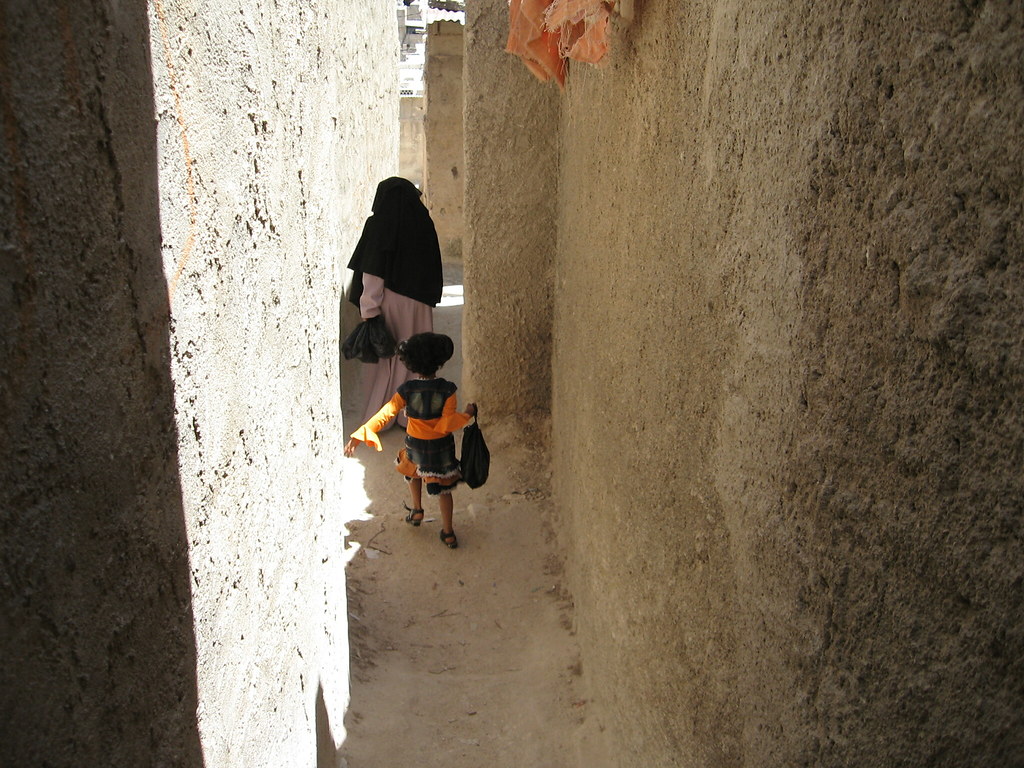
Narrow alleys in the Gaza refugee camp: photo by Einkarem1948, 10 June 2009
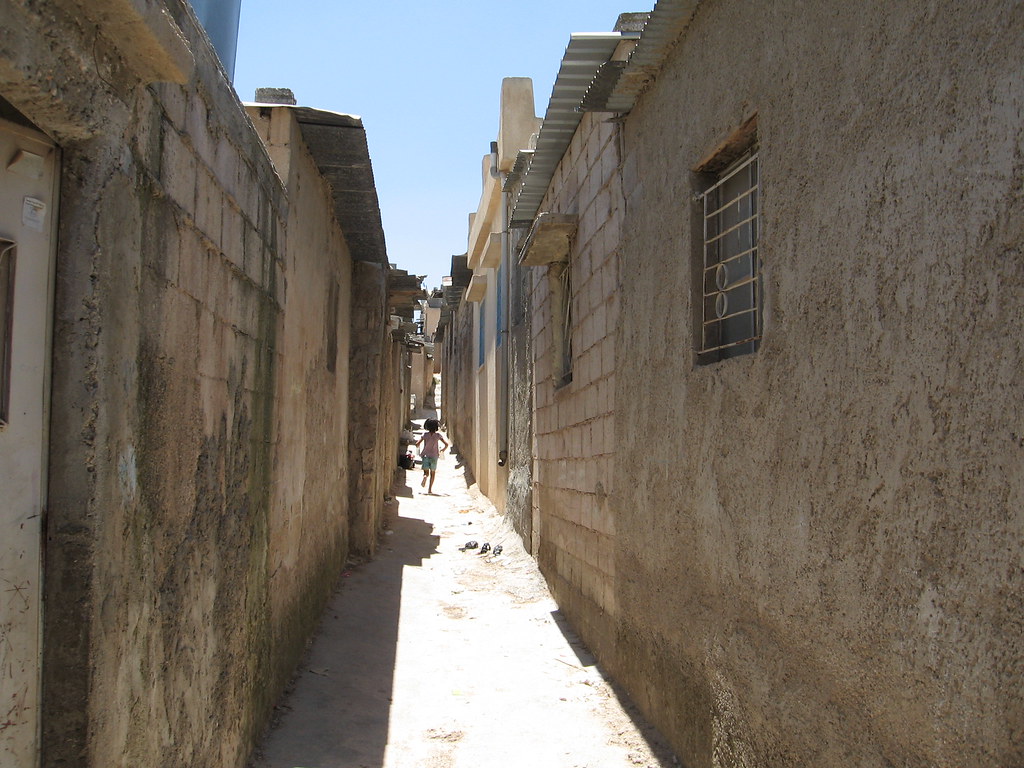
I am the bullets, the oranges and the memory: Mahmoud Darwish: Ahmad Al-Za’tar
Smoke from Israeli strikes rises over Gaza City, in the Gaza Strip. A police spokesman said Israeli aircraft have hit dozens of targets in the Gaza Strip, including the home of the late leader of Hamas' military wing, several mosques and a football stadium: photo by AP, 22 July 2014
Mahmoud Darwish: Ahmad Al-Za’tar
For two hands, of stone and of thyme
I dedicate this song. For Ahmad, forgotten between two butterflies
The clouds are gone and have left me homeless, and
The mountains have flung their mantles and concealed me
From the oozing old wound to the contours of the land I descend, and
The year marked the separation of the sea from the cities of ash, and
I was alone
Again alone
O alone? And Ahmad
Between two bullets was the exile of the sea
A camp grows and gives birth to fighters and to thyme
And an arm becomes strong in forgetfulness
Memory comes from trains that have left and
Platforms that are empty of welcome and of jasmine
In cars, in the landscape of the sea, in the intimate nights of prison cells
In quick liaisons and in the search for truth was
The discovery of self
In every thing, Ahmad found his opposite
For twenty years he was asking
For twenty years he was wandering
For twenty years, and for moments only, his mother gave him birth
In a vessel of banana leaves
And departed
He seeks an identity and is struck by the volcano
The clouds are gone and have left me homeless, and
The mountains have flung their mantles and concealed me
I am Ahmad the Arab, he said
I am the bullets, the oranges and the memory
Mahmoud Darwish (1941-2008): Ahmad Al-Za’tar, 1998, English version by Tania Nasir, 1998

A Palestinian man carries a wounded child to an emergency room in front of the media at Shifa hospital in Gaza City on July 20: photo by Khalil Hamra / AP, 20 July 2014
Shujai'ya 2014: A farewell to humanity?
Omar Ghraeib: Why I vowed not to have children in Gaza (2014)
Israel said the ground invasion into Gaza would be limited, which makes you think that the tanks would only advance a few meters in. That was the case for the first two days. Little did we know that Israel planned widespread ethnic cleansing and massacres. Israel’s goal was to wipe out an area, and the people who reside in it, too.
Things started escalating at around 10pm on Saturday. Israeli drones swooped down lower and started buzzing loudly. Tanks advanced. Apache helicopters and F-16 warplanes bombed and also provided cover. And then the eastern Gaza City neighborhood of Shujaiya started getting hit hard.
Non-stop shelling. I heard it all from my house. I couldn’t even keep up with the number of explosions and artillery rounds.
Hundreds and hundreds of families evacuated, leaving their homes and lives behind, seeking refuge in any calmer place, even though nowhere is safe in Gaza.
They walked in the streets, holding nothing but their kids, trying to escape death. Some even climbed into the shovel of a bulldozer. Many were just wandering in the streets with no destination in mind or nowhere to go.
I don’t know how to describe that night. I am at loss for words and out of breath. Gaza looked like a huge ball of fire as Shujaiya was being burned.
All of Gaza was under darkness. Power outages have reached twenty hours per day, or even more. We could hear the merciless attacks on Shujaiya, people screaming and fires burning.
All we had was a radio to let us know what we already knew but wanted to deny. We kept holding onto the last thread of hope un we had to face the truth: the people of Shujaiya were being butchered.
Every night we count down the hours, waiting for dawn to start breaking through, lighting up the sky and pumping Gaza with sun. But not that night. We were hoping the sun would take its time so we could delay seeing what the light would reveal.
We expected what had happened, but what the light showed was beyond devastation.
*
We couldn’t recognize Shujaiya. It was like a tsunami of bullets had struck the area. Or a blazing earthquake. Something natural but disastrous. But what really happened was beyond nature or even humanity. It was like the 1948 Nakba all over again, with scenes similar to the 1982 Sabra and Shatila massacre. There were flashbacks to the Cast Lead massacre of five-and-a-half years ago, too.
The Red Cross proposed a humanitarian ceasefire in Shujaiya so that medics could pull out the dozens of dead and hundreds of injured. Israel refused the ceasefire at first, then accepted it, and then broke it by bombing the area and opneing fire on medics and ambulances.
Medics managed to pull out 72 dead Palestinians, their bodies splayed across the streets. More than four hundred injured people were taken to the hospital.
Medics say that the numbers of the dead and injured may increase dramatically.
International and local journalists, medics and doctors were crying in pure disbelief. They reported seeing a massacre that can’t be unseen.
I guess we are all scarred for the rest of our lives.
Pictures of devastation and destruction were circulating from that morning on.
But what was very painful, to the extent that I stopped breathing, are the pictures of parents carrying their dead and injured children while they wept in a way that could move mountains.
When will Palestinians be recognized as people? As humans? As civilians?
When will our children have human rights and be safe?
*
Can you imagine the devastation of a father who is holding his child dead in his hands? Can you imagine his loss? And how ashamed and guilty he feels for not being able to protect his child?
That’s why I vowed to never, ever to have children here. I will not bring them to this world and fail to protect them. I will not watch my children die. It is too painful watching other children die and their parents weep; I can’t handle going through it myself.
How could the world consider wiping out a whole area and its residents as “self defense” and “righteous?” How can children be considered “militants” and “terrorists?”
The mosque nearby started calling for a donation campaign, only to make me feel more powerless. What can you give to those who lost their loved ones, their houses and a life they once knew?
I wished I could give them my heart or ease their pain in any way, but I couldn’t, so I joined a trivial donations campaign. How can money or material things ever make up for the loss of your child?
I spent hours feeling numb, paralyzed, breathless and stunned. I couldn’t shed a tear.
And then, tears started flowing. So abundantly. They were very hot, and burned my cheeks.
On Tuesday, the Gaza-based Ministry of Health said that more than 600
Palestinians have been killed and 3,700 injured since the beginning of Israel’s ongoing offensive against the besieged Gaza Strip, including the 72 killed and 400 injured in the Shujaiya massacre.
People were showered with tank shells while they slept at home in their beds.
People either fled or died under the rubble.
*
As I bid farewell to my humanity and soul today, and mourn them, I bid farewell to the dead Arab nation and Arab leaders, but without mourning. Human rights organizations, as well — I bid them farewell; they have always failed to protect human rights. Reports and documents do not protect innocent children.
I also bid farewell to all aid agencies in Gaza, for using the blood of Palestinians as a propaganda stunt to collect millions in “donations.” I bid farewell to international humanity.
Omar Ghraeib: Why I vowed not to have children in Gaza, The Electronic Intifada, 20 July 2014

Gaza: The Pantry of the Future-Devourers: photo by Ibrahim Abu Mustafa, 28 May 2007; image by AnomalousNYC, 5 June 2007
Gaza:
The Pantry of the Future-Devourers | As Palestinians mark the dismal 40th Anniversary of the Israeli
Occupation, Israel rains bombs on the crowded cities and refugees camps
of Gaza, among the most densely populated pieces of land in the world.
Behind
all the bluster, it is seldom mentioned that nearly half of the
population of the Gaza Strip are under the age of 14, and that the
majority of all victims of Israel's daily attacks are children and other
civilians. Virtually all of these children have either
personally witnessed people murdered by israelis, or lost one or more
family members or relatives to Israeli attacks. Virtually all of them,
unsurprisingly, exhibit symptoms of acute forms of psychological trauma.
Virtually
none of these children have ever been permitted outside the walls which
enclose Gaza. Until recently, most of them had never even seen the
ocean, even though the Strip is only two miles wide, because of Israeli
movement restrictions and the Jewish-only beachfront settlements which
took up one-third of the land of Gaza. Of the 1,500,000
people crammed into the Gaza prison -- most of them refugees from
Israeli ethnic cleansing -- fully 1,100,000 of them are entirely
dependent on ouside food aid to survive. Perversely,
Israel routinely blocks and restricts the delivery of food and water to
Gazans, and constantly lobbies other states to do the same. As a
consequence, according to the UN, Gazans are suffering from malnutrition
at levels comparable to the worst famine zones of sub-saharan Africa,
and one in ten of these children will suffer some degree of phsyical and
mental retardation.This week, former Chief Rabbi
Mordechai Eliayhu declared that every one of these children is a
legitimate target for Israeli attack. He proposed that the launching of
rockets from Gaza against the city of Sderot, which recently killed two
Jews, permits Jews to indiscriminately kill "even a million"
Palestinians. The Jerusalem Post notes that his religious ruling will be distributed to every synagogue in Israel.: image by AnomalousNYC, 5 June 2007

Israeli soldiers rest next to artillery shells from an artillery unit near the Israeli border with Gaza. The death toll after 14 days of fighting was at least 509, Gaza Health Ministry spokesman Ashraf al-Qedra said, adding that some 3,150 have been injured: photo by EPA, 20 July 2014
Matthew Wagner, Jerusalem Post, 30 May 2007
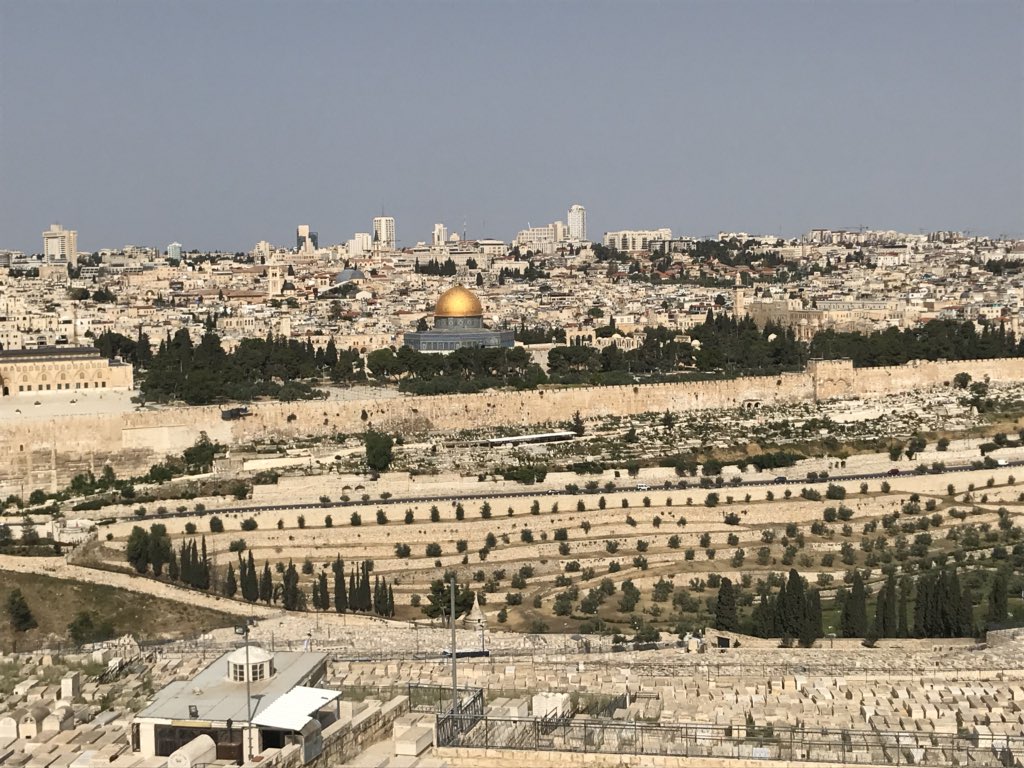


Gaza City is seen in northern Gaza strip early Saturday, July 19, 2014.
Israeli troops pushed deeper into Gaza on Friday in a ground offensive
that officials said could last up to two weeks as the prime minister
ordered the military to prepare for a "significantly" wider campaign: photo by Lefteris Pitarakis / AP, 18 July 2014

Rabbi Ophir Wallas addressing students: screenshot: wwwdotbneidaviddotorg via mondoweiss, 17 April 2018

Israel said the ground invasion into Gaza would be limited, which makes you think that the tanks would only advance a few meters in. That was the case for the first two days. Little did we know that Israel planned widespread ethnic cleansing and massacres. Israel’s goal was to wipe out an area, and the people who reside in it, too.
Things started escalating at around 10pm on Saturday. Israeli drones swooped down lower and started buzzing loudly. Tanks advanced. Apache helicopters and F-16 warplanes bombed and also provided cover. And then the eastern Gaza City neighborhood of Shujaiya started getting hit hard.
Non-stop shelling. I heard it all from my house. I couldn’t even keep up with the number of explosions and artillery rounds.
Hundreds and hundreds of families evacuated, leaving their homes and lives behind, seeking refuge in any calmer place, even though nowhere is safe in Gaza.
They walked in the streets, holding nothing but their kids, trying to escape death. Some even climbed into the shovel of a bulldozer. Many were just wandering in the streets with no destination in mind or nowhere to go.
*
Many ended up gathering at al-Shifa hospital, only to see the bodies of their relatives, neighbors and friends arrive.I don’t know how to describe that night. I am at loss for words and out of breath. Gaza looked like a huge ball of fire as Shujaiya was being burned.
All of Gaza was under darkness. Power outages have reached twenty hours per day, or even more. We could hear the merciless attacks on Shujaiya, people screaming and fires burning.
All we had was a radio to let us know what we already knew but wanted to deny. We kept holding onto the last thread of hope un we had to face the truth: the people of Shujaiya were being butchered.
Every night we count down the hours, waiting for dawn to start breaking through, lighting up the sky and pumping Gaza with sun. But not that night. We were hoping the sun would take its time so we could delay seeing what the light would reveal.
We expected what had happened, but what the light showed was beyond devastation.
We couldn’t recognize Shujaiya. It was like a tsunami of bullets had struck the area. Or a blazing earthquake. Something natural but disastrous. But what really happened was beyond nature or even humanity. It was like the 1948 Nakba all over again, with scenes similar to the 1982 Sabra and Shatila massacre. There were flashbacks to the Cast Lead massacre of five-and-a-half years ago, too.
The Red Cross proposed a humanitarian ceasefire in Shujaiya so that medics could pull out the dozens of dead and hundreds of injured. Israel refused the ceasefire at first, then accepted it, and then broke it by bombing the area and opneing fire on medics and ambulances.
Medics managed to pull out 72 dead Palestinians, their bodies splayed across the streets. More than four hundred injured people were taken to the hospital.
Medics say that the numbers of the dead and injured may increase dramatically.
International and local journalists, medics and doctors were crying in pure disbelief. They reported seeing a massacre that can’t be unseen.
I guess we are all scarred for the rest of our lives.
Pictures of devastation and destruction were circulating from that morning on.
But what was very painful, to the extent that I stopped breathing, are the pictures of parents carrying their dead and injured children while they wept in a way that could move mountains.
When will Palestinians be recognized as people? As humans? As civilians?
When will our children have human rights and be safe?
Israeli
cannon fires artillery shells from an artillery unit near the Israeli
border with Gaza. Four Palestinians were killed and 50 others wounded
when Israeli shells struck a hospital in central Gaza, despite a call by
the UN Security Council for a truce: photo by EPA, 22 July 2014
Can you imagine the devastation of a father who is holding his child dead in his hands? Can you imagine his loss? And how ashamed and guilty he feels for not being able to protect his child?
That’s why I vowed to never, ever to have children here. I will not bring them to this world and fail to protect them. I will not watch my children die. It is too painful watching other children die and their parents weep; I can’t handle going through it myself.
How could the world consider wiping out a whole area and its residents as “self defense” and “righteous?” How can children be considered “militants” and “terrorists?”
The mosque nearby started calling for a donation campaign, only to make me feel more powerless. What can you give to those who lost their loved ones, their houses and a life they once knew?
I wished I could give them my heart or ease their pain in any way, but I couldn’t, so I joined a trivial donations campaign. How can money or material things ever make up for the loss of your child?
I spent hours feeling numb, paralyzed, breathless and stunned. I couldn’t shed a tear.
And then, tears started flowing. So abundantly. They were very hot, and burned my cheeks.
On Tuesday, the Gaza-based Ministry of Health said that more than 600
Palestinians have been killed and 3,700 injured since the beginning of Israel’s ongoing offensive against the besieged Gaza Strip, including the 72 killed and 400 injured in the Shujaiya massacre.
People were showered with tank shells while they slept at home in their beds.
People either fled or died under the rubble.
*
As I bid farewell to my humanity and soul today, and mourn them, I bid farewell to the dead Arab nation and Arab leaders, but without mourning. Human rights organizations, as well — I bid them farewell; they have always failed to protect human rights. Reports and documents do not protect innocent children.
I also bid farewell to all aid agencies in Gaza, for using the blood of Palestinians as a propaganda stunt to collect millions in “donations.” I bid farewell to international humanity.
Omar Ghraeib: Why I vowed not to have children in Gaza, The Electronic Intifada, 20 July 2014

Gaza: The Pantry of the Future-Devourers: photo by Ibrahim Abu Mustafa, 28 May 2007; image by AnomalousNYC, 5 June 2007

Israeli soldiers rest next to artillery shells from an artillery unit near the Israeli border with Gaza. The death toll after 14 days of fighting was at least 509, Gaza Health Ministry spokesman Ashraf al-Qedra said, adding that some 3,150 have been injured: photo by EPA, 20 July 2014
Eliyahu advocates carpet bombing Gaza
All
civilians living in Gaza are collectively guilty for Kassam attacks on
Sderot, former Sephardi chief rabbi Mordechai Eliyahu has written in a
letter to Prime Minister Ehud Olmert. Eliyahu ruled that
there was absolutely no moral prohibition against the indiscriminate
killing of civilians during a potential massive military offensive on
Gaza aimed at stopping the rocket launchings. The letter,
published in Olam Katan [Small World], a weekly pamphlet to be
distributed in synagogues nationwide this Friday, cited the biblical
story of the Shechem massacre (Genesis 34) and Maimonides' commentary
(Laws of Kings 9, 14) on the story as proof texts for his legal
decision. According to Jewish war ethics, wrote Eliyahu,
an entire city holds collective responsibility for the immoral behavior
of individuals. In Gaza, the entire populace is responsible because they
do nothing to stop the firing of Kassam rockets. The
former chief rabbi also said it was forbidden to risk the lives of Jews
in Sderot or the lives of IDF soldiers for fear of injuring or killing
Palestinian noncombatants living in Gaza. Eliyahu could
not be reached for an interview. However, Eliyahu's son, Shmuel Eliyahu,
who is chief rabbi of Safed, said his father opposed a ground troop
incursion into Gaza that would endanger IDF soldiers. Rather, he
advocated carpet bombing the general area from which the Kassams were
launched, regardless of the price in Palestinian life."If
they don't stop after we kill 100, then we must kill a thousand," said
Shmuel Eliyahu. "And if they do not stop after 1,000 then we must kill
10,000. If they still don't stop we must kill 100,000, even a million.
Whatever it takes to make them stop." In the letter,
Eliyahu quoted from Psalms. "I will pursue my enemies and apprehend them
and I will not desist until I have eradicated them.
Matthew Wagner, Jerusalem Post, 30 May 2007

The town of Old Jerusalem and the Dome of the Rock this morning: image via Zena Al Tahhan @zenatahhan, 19 April 2018

Mahmoud Darwish (1941-2008): Under Siege, from A State of Siege, 2002, English version by Marjolijn De Jager

An explosion caused by an Israeli strike is seen in Gaza City, northern Gaza Strip, late Saturday, July 19, 2014. Gaza Health Ministry spokesman Ashraf al-Kidra said the new round of strikes raised the death toll from the 12-day offensive to more than 330 Palestinians, many of them civilians and nearly a fourth of them under the age of 18: photo by Lefteris Pitarakis / AP, 19 July 2014

In this image made with a long exposure, the sky and the city are lit by Israeli forces' flares in the northern Gaza Strip, Friday, July 18, 2014. Israeli troops pushed deeper into Gaza on Friday to destroy rocket launching sites and tunnels, firing volleys of tank shells and clashing with Palestinian fighters in a high-stakes ground offensive meant to weaken the enclave's Hamas rulers: photo by Lefteris Pitarakis / AP, 18 July 2014

Israeli forces' flares light up the night sky in the northern Gaza Strip, early Saturday, July 19, 2014: photo by Adel Hana / AP, 19 July 2014

Israeli forces' flares light up the night sky in the northern Gaza Strip, Friday, July 18, 2014: photo by Adel Hana / AP, 18 July 2014

A Palestinian child runs on debris from a destroyed house, following an overnight Israeli strike in Beit Lahiya, in northern Gaza strip, Saturday, July 19, 2014. A Gaza health official says the death toll from Israel's 12-day offensive against Hamas militants has topped 300: photo by Lefteris Pitarakis / AP, 19 July 2014

A Palestinian child walks on debris from a destroyed house, following an overnight Israeli strike in Beit Lahiya, in northern Gaza strip, Saturday, July 19, 2014: photo by Lefteris Pitarakis / AP, 19 July 2014

Palestinians flee their homes in Beit Hanoun, northern Gaza Strip, following heavy Israeli shelling, Saturday, July 19, 2014. Gaza Health Ministry spokesman Ashraf al-Kidra said the new round of strikes raised the death toll from the 12-day offensive to more than 330 Palestinians, many of them civilians: photo by Lefteris Pitarakis / AP, 19 July 2014

A Palestinian medic is overwhelmed by emotion as he takes a break
treating wounded people by Israeli strikes, at the emergency room of the
Kamal Adwan hospital in Beit Lahiya, Saturday, July 19, 2014: photo by Lefteris Pitarakis / AP, 19 July 2014

Palestinian relatives mourn for Qasim Alwan, 4, and Imad Alwan, 6, who were killed Friday by an Israeli tank shell, during their funeral in Gaza City, Saturday, July 19, 2014l: photo by Hatem Moussa / AP, 19 July 2014

Palestinian relatives mourn for Qasim Alwan, 4, and Imad Alwan, 6, who were killed Friday by an Israeli tank shell, during their funeral in Gaza City, Saturday, July 19, 2014. Relatives say the tank shell hit the Alwan family's kitchen, killing Qasim and Imad: photo by Hatem Moussa / AP, 19 July 2014

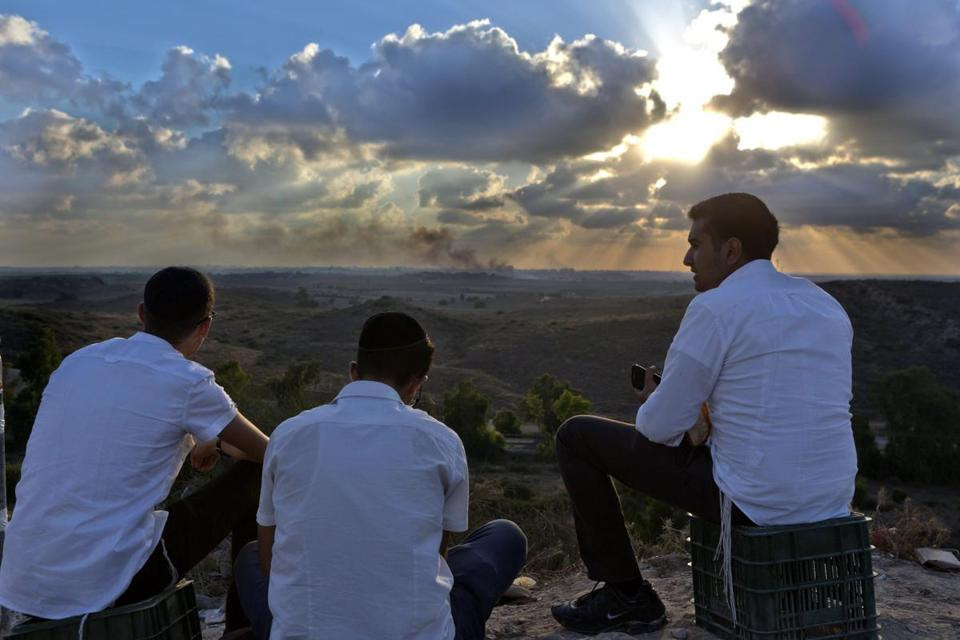
Israelis sit on a hill overlooking the Gaza Strip as smoke rises from the scene of an airstrike: photo by Jim Hollander / EPA, 17 July 2014
A Privileged Seat in the Theatre of Eternal Conflict
Mahmoud Darwish: Under Siege

Protesters in Philadelphia
demonstrate in support of the ongoing Israeli military operation on the
Gaza strip, on Friday, July 18, 2014. Israeli troops
pushed into Gaza on Friday in a ground offensive that officials said
could last up to two weeks as the prime minister ordered the military to
prepare for a "significantly" wider campaign: photo by Matt Rourke / AP, 18 July 2014
Here on the slopes of hills, facing the dusk and the cannon of time
Close to the gardens of broken shadows,
We do what prisoners do,
And what the jobless do:
We cultivate hope.
***
A country preparing for dawn. We grow less intelligent
For we closely watch the hour of victory:
No night in our night lit up by the shelling
Our enemies are watchful and light the light for us
In the darkness of cellars.
***
Here there is no "I".
Here Adam remembers the dust of his clay.
***
On the verge of death, he says:
I have no trace left to lose:
Free I am so close to my liberty. My future lies in my own hand.
Soon I shall penetrate my life,
I shall be born free and parentless,
And as my name I shall choose azure letters...
***
You who stand in the doorway, come in,
Drink Arabic coffee with us
And you will sense that you are men like us
You who stand in the doorways of houses
Come out of our morningtimes,
We shall feel reassured to be
Men like you!
***
When the planes disappear, the white, white doves
Fly off and wash the cheeks of heaven
With unbound wings taking radiance back again, taking possession
Of the ether and of play. Higher, higher still, the white, white doves
Fly off. Ah, if only the sky
Were real [a man passing between two bombs said to me].
***
Cypresses behind the soldiers, minarets protecting
The sky from collapse. Behind the hedge of steel
Soldiers piss -- under the watchful eye of a tank --
And the autumnal day ends its golden wandering in
A street as wide as a church after Sunday mass...
***
[To a killer] If you had contemplated the victim’s face
And thought it through, you would have remembered your mother in the
Gas chamber, you would have been freed from the reason for the rifle
And you would have changed your mind: this is not the way
to find one’s identity again.
***
The siege is a waiting period
Waiting on the tilted ladder in the middle of the storm.
***
Alone, we are alone as far down as the sediment
Were it not for the visits of the rainbows.
***
We have brothers behind this expanse.
Excellent brothers. They love us. They watch us and weep.
Then, in secret, they tell each other:
"Ah! if this siege had been declared..." They do not finish their sentence:
"Don’t abandon us, don’t leave us."
***
Our losses: between two and eight martyrs each day.
And ten wounded.
And twenty homes.
And fifty olive trees...
Added to this the structural flaw that
Will arrive at the poem, the play, and the unfinished canvas.
***
A woman told the cloud: cover my beloved
For my clothing is drenched with his blood.
***
If you are not rain, my love
Be tree
Sated with fertility, be tree
If you are not tree, my love
Be stone
Saturated with humidity, be stone
If you are not stone, my love
Be moon
In the dream of the beloved woman, be moon
[So spoke a woman
to her son at his funeral]
***
Oh watchmen! Are you not weary
Of lying in wait for the light in our salt
And of the incandescence of the rose in our wound
Are you not weary, oh watchmen?
***
A little of this absolute and blue infinity
Would be enough
To lighten the burden of these times
And to cleanse the mire of this place.
***
It is up to the soul to come down from its mount
And on its silken feet walk
By my side, hand in hand, like two longtime
Friends who share the ancient bread
And the antique glass of wine
May we walk this road together
And then our days will take different directions:
I, beyond nature, which in turn
Will choose to squat on a high-up rock.
***
On my rubble the shadow grows green,
And the wolf is dozing on the skin of my goat
He dreams as I do, as the angel does
That life is here...not over there.
***
In the state of siege, time becomes space
Transfixed in its eternity
In the state of siege, space becomes time
That has missed its yesterday and its tomorrow.
***
The martyr encircles me every time I live a new day
And questions me: Where were you? Take every word
You have given me back to the dictionaries
And relieve the sleepers from the echo’s buzz.
***
The martyr enlightens me: beyond the expanse
I did not look
For the virgins of immortality for I love life
On earth, amid fig trees and pines,
But I cannot reach it, and then, too, I took aim at it
With my last possession: the blood in the body of azure.
***
The martyr warned me: Do not believe their ululations
Believe my father when, weeping, he looks at my photograph
How did we trade roles, my son, how did you precede me.
I first, I the first one!
***
The martyr encircles me: my place and my crude furniture are all that I have changed.
I put a gazelle on my bed,
And a crescent of moon on my finger
To appease my sorrow.
***
The siege will last in order to convince us we must choose an enslavement that does no harm, in fullest liberty!
***
Resisting means assuring oneself of the heart’s health,
The health of the testicles and of your tenacious disease:
The disease of hope.
***
And in what remains of the dawn, I walk toward my exterior
And in what remains of the night, I hear the sound of footsteps inside me.
***
Greetings to the one who shares with me an attention to
The drunkenness of light, the light of the butterfly, in the
Blackness of this tunnel!
***
Greetings to the one who shares my glass with me
In the denseness of a night outflanking the two spaces:
Greetings to my apparition.
***
My friends are always preparing a farewell feast for me,
A soothing grave in the shade of oak trees
A marble epitaph of time
And always I anticipate them at the funeral:
Who then has died...who?
***
Writing is a puppy biting nothingness
Writing wounds without a trace of blood.
***
Our cups of coffee. Birds green trees
In the blue shade, the sun gambols from one wall
To another like a gazelle
The water in the clouds has the unlimited shape of what is left to us
Of the sky. And other things of suspended memories
Reveal that this morning is powerful and splendid,
And that we are the guests of eternity.
Close to the gardens of broken shadows,
We do what prisoners do,
And what the jobless do:
We cultivate hope.
***
A country preparing for dawn. We grow less intelligent
For we closely watch the hour of victory:
No night in our night lit up by the shelling
Our enemies are watchful and light the light for us
In the darkness of cellars.
***
Here there is no "I".
Here Adam remembers the dust of his clay.
***
On the verge of death, he says:
I have no trace left to lose:
Free I am so close to my liberty. My future lies in my own hand.
Soon I shall penetrate my life,
I shall be born free and parentless,
And as my name I shall choose azure letters...
***
You who stand in the doorway, come in,
Drink Arabic coffee with us
And you will sense that you are men like us
You who stand in the doorways of houses
Come out of our morningtimes,
We shall feel reassured to be
Men like you!
***
When the planes disappear, the white, white doves
Fly off and wash the cheeks of heaven
With unbound wings taking radiance back again, taking possession
Of the ether and of play. Higher, higher still, the white, white doves
Fly off. Ah, if only the sky
Were real [a man passing between two bombs said to me].
***
Cypresses behind the soldiers, minarets protecting
The sky from collapse. Behind the hedge of steel
Soldiers piss -- under the watchful eye of a tank --
And the autumnal day ends its golden wandering in
A street as wide as a church after Sunday mass...
***
[To a killer] If you had contemplated the victim’s face
And thought it through, you would have remembered your mother in the
Gas chamber, you would have been freed from the reason for the rifle
And you would have changed your mind: this is not the way
to find one’s identity again.
***
The siege is a waiting period
Waiting on the tilted ladder in the middle of the storm.
***
Alone, we are alone as far down as the sediment
Were it not for the visits of the rainbows.
***
We have brothers behind this expanse.
Excellent brothers. They love us. They watch us and weep.
Then, in secret, they tell each other:
"Ah! if this siege had been declared..." They do not finish their sentence:
"Don’t abandon us, don’t leave us."
***
Our losses: between two and eight martyrs each day.
And ten wounded.
And twenty homes.
And fifty olive trees...
Added to this the structural flaw that
Will arrive at the poem, the play, and the unfinished canvas.
***
A woman told the cloud: cover my beloved
For my clothing is drenched with his blood.
***
If you are not rain, my love
Be tree
Sated with fertility, be tree
If you are not tree, my love
Be stone
Saturated with humidity, be stone
If you are not stone, my love
Be moon
In the dream of the beloved woman, be moon
[So spoke a woman
to her son at his funeral]
***
Oh watchmen! Are you not weary
Of lying in wait for the light in our salt
And of the incandescence of the rose in our wound
Are you not weary, oh watchmen?
***
A little of this absolute and blue infinity
Would be enough
To lighten the burden of these times
And to cleanse the mire of this place.
***
It is up to the soul to come down from its mount
And on its silken feet walk
By my side, hand in hand, like two longtime
Friends who share the ancient bread
And the antique glass of wine
May we walk this road together
And then our days will take different directions:
I, beyond nature, which in turn
Will choose to squat on a high-up rock.
***
On my rubble the shadow grows green,
And the wolf is dozing on the skin of my goat
He dreams as I do, as the angel does
That life is here...not over there.
***
In the state of siege, time becomes space
Transfixed in its eternity
In the state of siege, space becomes time
That has missed its yesterday and its tomorrow.
***
The martyr encircles me every time I live a new day
And questions me: Where were you? Take every word
You have given me back to the dictionaries
And relieve the sleepers from the echo’s buzz.
***
The martyr enlightens me: beyond the expanse
I did not look
For the virgins of immortality for I love life
On earth, amid fig trees and pines,
But I cannot reach it, and then, too, I took aim at it
With my last possession: the blood in the body of azure.
***
The martyr warned me: Do not believe their ululations
Believe my father when, weeping, he looks at my photograph
How did we trade roles, my son, how did you precede me.
I first, I the first one!
***
The martyr encircles me: my place and my crude furniture are all that I have changed.
I put a gazelle on my bed,
And a crescent of moon on my finger
To appease my sorrow.
***
The siege will last in order to convince us we must choose an enslavement that does no harm, in fullest liberty!
***
Resisting means assuring oneself of the heart’s health,
The health of the testicles and of your tenacious disease:
The disease of hope.
***
And in what remains of the dawn, I walk toward my exterior
And in what remains of the night, I hear the sound of footsteps inside me.
***
Greetings to the one who shares with me an attention to
The drunkenness of light, the light of the butterfly, in the
Blackness of this tunnel!
***
Greetings to the one who shares my glass with me
In the denseness of a night outflanking the two spaces:
Greetings to my apparition.
***
My friends are always preparing a farewell feast for me,
A soothing grave in the shade of oak trees
A marble epitaph of time
And always I anticipate them at the funeral:
Who then has died...who?
***
Writing is a puppy biting nothingness
Writing wounds without a trace of blood.
***
Our cups of coffee. Birds green trees
In the blue shade, the sun gambols from one wall
To another like a gazelle
The water in the clouds has the unlimited shape of what is left to us
Of the sky. And other things of suspended memories
Reveal that this morning is powerful and splendid,
And that we are the guests of eternity.
.....................Ramallah, January 2002
Mahmoud Darwish (1941-2008): Under Siege, from A State of Siege, 2002, English version by Marjolijn De Jager

An explosion caused by an Israeli strike is seen in Gaza City, northern Gaza Strip, late Saturday, July 19, 2014. Gaza Health Ministry spokesman Ashraf al-Kidra said the new round of strikes raised the death toll from the 12-day offensive to more than 330 Palestinians, many of them civilians and nearly a fourth of them under the age of 18: photo by Lefteris Pitarakis / AP, 19 July 2014

In this image made with a long exposure, the sky and the city are lit by Israeli forces' flares in the northern Gaza Strip, Friday, July 18, 2014. Israeli troops pushed deeper into Gaza on Friday to destroy rocket launching sites and tunnels, firing volleys of tank shells and clashing with Palestinian fighters in a high-stakes ground offensive meant to weaken the enclave's Hamas rulers: photo by Lefteris Pitarakis / AP, 18 July 2014

Israeli forces' flares light up the night sky in the northern Gaza Strip, early Saturday, July 19, 2014: photo by Adel Hana / AP, 19 July 2014

Israeli forces' flares light up the night sky in the northern Gaza Strip, Friday, July 18, 2014: photo by Adel Hana / AP, 18 July 2014

A Palestinian child runs on debris from a destroyed house, following an overnight Israeli strike in Beit Lahiya, in northern Gaza strip, Saturday, July 19, 2014. A Gaza health official says the death toll from Israel's 12-day offensive against Hamas militants has topped 300: photo by Lefteris Pitarakis / AP, 19 July 2014

A Palestinian child walks on debris from a destroyed house, following an overnight Israeli strike in Beit Lahiya, in northern Gaza strip, Saturday, July 19, 2014: photo by Lefteris Pitarakis / AP, 19 July 2014

Palestinians flee their homes in Beit Hanoun, northern Gaza Strip, following heavy Israeli shelling, Saturday, July 19, 2014. Gaza Health Ministry spokesman Ashraf al-Kidra said the new round of strikes raised the death toll from the 12-day offensive to more than 330 Palestinians, many of them civilians: photo by Lefteris Pitarakis / AP, 19 July 2014


Palestinian relatives mourn for Qasim Alwan, 4, and Imad Alwan, 6, who were killed Friday by an Israeli tank shell, during their funeral in Gaza City, Saturday, July 19, 2014l: photo by Hatem Moussa / AP, 19 July 2014

Palestinian relatives mourn for Qasim Alwan, 4, and Imad Alwan, 6, who were killed Friday by an Israeli tank shell, during their funeral in Gaza City, Saturday, July 19, 2014. Relatives say the tank shell hit the Alwan family's kitchen, killing Qasim and Imad: photo by Hatem Moussa / AP, 19 July 2014

Protesters
hold posters designed with images of the Palestinian flag during a
demonstration to show support for Palestinians in front of Israel's
diplomatic headquarters, in Quito, Ecuador, Friday, July 18, 2014: photo by Dolores Ochoa / AP, 18 July 2014

Israelis sit on a hill overlooking the Gaza Strip as smoke rises from the scene of an airstrike: photo by Jim Hollander / EPA, 17 July 2014
A Privileged Seat in the Theatre of Eternal Conflict
Beer in the coolers, instruments precisely adjusted,
As night falls expectation grows among the faithful
Overlooking the grand guignol lightshow,
Overlooking the grand guignol lightshow,
The most privileged seats in the house reserved for the high end righteous
The chosen ones
As was so long ago foretold.
August 2014
August 2014

Israeli
forces' flares light up the night sky in the northern Gaza Strip, early
Saturday, July 19, 2014: photo by Adel Hana / AP, 19 July 2014

Genocide is a mitzvah

Rabbi Ophir Wallas addressing students: screenshot: wwwdotbneidaviddotorg via mondoweiss, 17 April 2018
Influential rabbi teaches would-be Israeli soldiers: Genocide is a mitzvah: Yossi Gurvitz, Mondoweiss, 17 April 2018
Rabbi Ophir Wallas of the Bnei David Military Mechina
was caught on video teaching young would-be soldiers that Israelis are,
from the halachaic point of view, permitted to wipe out Palestinians,
and that only fear of massive retaliation prevents that.
Rabbi Wallas’ words are taken from a longer lecture he has given his students. Here is my translation, with essential footnotes:
“In conquering the Land [of Israel] according to Nachmanides and Rashi [*], who say that the wars of today are also mitzvah
wars for conquering the Land, I am beholden to nothing. This isn’t the
law of the persecutor [**], right? What law are we dealing with? The
laws of a mitzvah war,
a war of occupying the Land. Even if I don’t conquer Gaza right now,
[conquering it] is part of my ability to settle the Land of Israel, so
it is also a part of the mitzvah of
conquering the Land. And therefore it follows, there’s no other way;
like, we’d have to kill them all. Because this is the difference between
the Law of the Persecutor and mitzvah wars. […] A mitzvah war of conquering the Land, which is not limited to saving the people of Israel from their enemies, according to some of the Rishonim
[***] I could, on the face of it and by the essential law, destroy,
kill and cause to perish [****] all of them. I will not do so, because
if I were to do so, and reject international treaties, then the State of
Israel shall parish, unless we shall witness a miracle of miracles –
and one must not trust in a miracle. And that’s the only reason I won’t
do it.”
A few other notes are essential. First, and please bear with me, what is a mechina?
Literally, it means a “preliminary school”, but in Israel it came to
mean a school which prepares students who finished their high school
studies for military service. While most Israeli Jews are drafted soon
after finishing high school, a select few are allowed to study for one
more year, and in this year they are supposed to be indoctrinated to
become better soldiers. Most mechinas boast of a high percentage of graduates who go on to become officers and serve longer than draftees. With one exception, all mechinas are religious, and are in fact a form of yeshiva. Mechina teachers are public employees who get their salaries from both the Education Ministry and the Defense Ministry. Mechina leaders
often meet with senior officers, up to the Chief of Staff, and
participate in high-level discussions about the level of religiosity of
the army, particularly whether women may serve with men. The fact that
the mechinas
are producing a large number of motivated officers when most Israelis
do not wish to become officers gives them unusual leverage with the high
command – with the result that they are rarely, if ever, supervised.
This began to change over the last year. The Bnei David mechina,
the first of them, has long been considered the flagship of the
National Religious movement, and its leader, Rabbi Elli Saddan, even won
the Israel Prize – the country’s highest civil honor – for his
contribution to education. However, over the last year, several rabbis
of the mechina – including Saddan himself – were caught on videos saying highly inflammatory things. The main targets of the mechina
rabbis have been gays and women; the utterances were so inflammatory,
as the rabbis exposed their misogyny and homophobia, that the Minister
of Defense demanded at one point that one of the worst offenders,
Saddan’s deputy Yigal Lewinstein, resign or the mechina will be sanctioned. Soon after, Lewinstein went on “vacation”, but the mechina insisted he was not fired.
As one scandal after another hit Bnei David, leftists have made it a habit to go over the mechina’s
videoed lectures looking for bait. The Wallas quote is the latest
prize. Most of the haul, however, dealt with misogyny and homophobia.
This is one of the rare examples of what Bnei David rabbis think about
Palestinians.
Now we need a crash course in Jewish [not Israeli] warfare law. It basically distinguishes between two sorts of wars: reshut (permitted) wars and mitzvah (ordained) wars. Kings are permitted to go on reshut wars if they so please, but such wars are handled under relatively humane laws. Mitzvah
laws are a different concept entirely: they are holy wars, the enemy is
considered to be the enemy of God, and, as Wallas says, “I am beholden
to nothing.” The model is the extermination wars of the biblical Joshua.
Most Halacha scholars are divided about what constitutes a mitzvah war, but they agree that wars to reconquer the Holy Land fit the bill – after all, they are modeled on Joshua’s.
There used to be a snag: Only a king could declare a mitzvah
wars, and Judaism was not supposed to have a king until the messiah
came. The National Religious movement made a leap of faith over this
hurdle: it declared Israel to be “the beginning of the growth of our
redemption” (a phrase recited every year in the Independence Day
prayers), and treats the state as semi-holy, and one that may declare mitzvah wars.
And, at the end of
the chain, we have a government-sponsored rabbi teaching children ardent
for some desperate glory that legally they are permitted to order their
soldiers to destroy, kill and cause to perish women, old men, and
children. Yes, there is still a caveat: If Israel is to suffer because
of international treaties, it shouldn’t be done.
But what if the time is right?
Technically, Rabbi
Wallas is somewhat under military supervision. As his teachings – while
essentially correct, alas – go directly against military law, one might
expect he’d be removed, demoted or reprimanded. But, while Lewinstein
was reprimanded for denigrating women soldiers, Wallas has less to fear.
No one in the military command cares about rabbis rhapsodizing about
genocide.
Notes
* Two prominent medieval glossa writers, Rabbi Moshe Ben Nachman and Rabbi Shlomo Yitzhaki
** A halachaic law permitting the harm, up to killing, of a person who is “persecuting” others and putting them in danger.
*** Jewish religious scholars of the High and Late Middle Ages period
**** Wallas is here quoting Haman’s order for the extermination of Jews, Esther 3:13.
***** then the State of
Israel shall parish, unless we shall witness a miracle of miracles Why is nobody mentioning that the Rab almost seems to be talking about Episcopalians, here, or is it just me, but nevermind?

Murdered in Cold Blood !
Palestinian Mohammad Ayoub 13 y/o shot in the head by Israeli sniper at the eastern border of #Gaza today.: image via mohammed mosleh @MohammadMusle16, 17 April 2018
If only I could make an effort, an effort of attention, to try and discover what's happening, what's happening to me, what then, I don't know, I've forgotten my apodosis, but I can't, I don't hear any more, I'm sleeping, they call that sleeping, there they are again, we'll have to start killing them again, I hear this horrible noise, coming back takes time, I don't know where from, I was nearly there, I was nearly sleeping, I call that sleeping, there is no one but me, there was never anyone but me, here I mean, elsewhere is another matter, I was never elsewhere, here is my only elsewhere, it's I who do this thing and I who suffer it, it's not possible otherwise, it's not possible so, it's not my fault, all I can say is that it's not my fault, it's not anyone's fault, since there isn't anyone it can't be anyone's fault, since there isn't anyone but me it can't be mine, sometimes you'd think I was reasoning, I've no objection, they must have taught me reasoning too, they must have begun teaching me, before they deserted me, I don't remember that period, but it must have marked me, I don't remember having been deserted, perhaps I received a shock.

Black Square: Kazimir Malevich, 1913 (Russian State Museum, Saint Petersburg)
Samuel
Beckett: Apodosis
If only I could make an effort, an effort of attention, to try and discover what's happening, what's happening to me, what then, I don't know, I've forgotten my apodosis, but I can't, I don't hear any more, I'm sleeping, they call that sleeping, there they are again, we'll have to start killing them again, I hear this horrible noise, coming back takes time, I don't know where from, I was nearly there, I was nearly sleeping, I call that sleeping, there is no one but me, there was never anyone but me, here I mean, elsewhere is another matter, I was never elsewhere, here is my only elsewhere, it's I who do this thing and I who suffer it, it's not possible otherwise, it's not possible so, it's not my fault, all I can say is that it's not my fault, it's not anyone's fault, since there isn't anyone it can't be anyone's fault, since there isn't anyone but me it can't be mine, sometimes you'd think I was reasoning, I've no objection, they must have taught me reasoning too, they must have begun teaching me, before they deserted me, I don't remember that period, but it must have marked me, I don't remember having been deserted, perhaps I received a shock.
Samuel Beckett (1906-1989): from The Unnamable (translated from the French by the
author, 1959)

Black Square: Kazimir Malevich, 1913 (Russian State Museum, Saint Petersburg)
there they are again, we'll have to
start killing them again

A Palestinian
protester wears a tyre on his head with an onion (to protect himself
from tear gas) dangling from it [Hosam Salem/Al Jazeera] #Gaza : image via HosamSalem @HosamSalemG, 13 April 2018
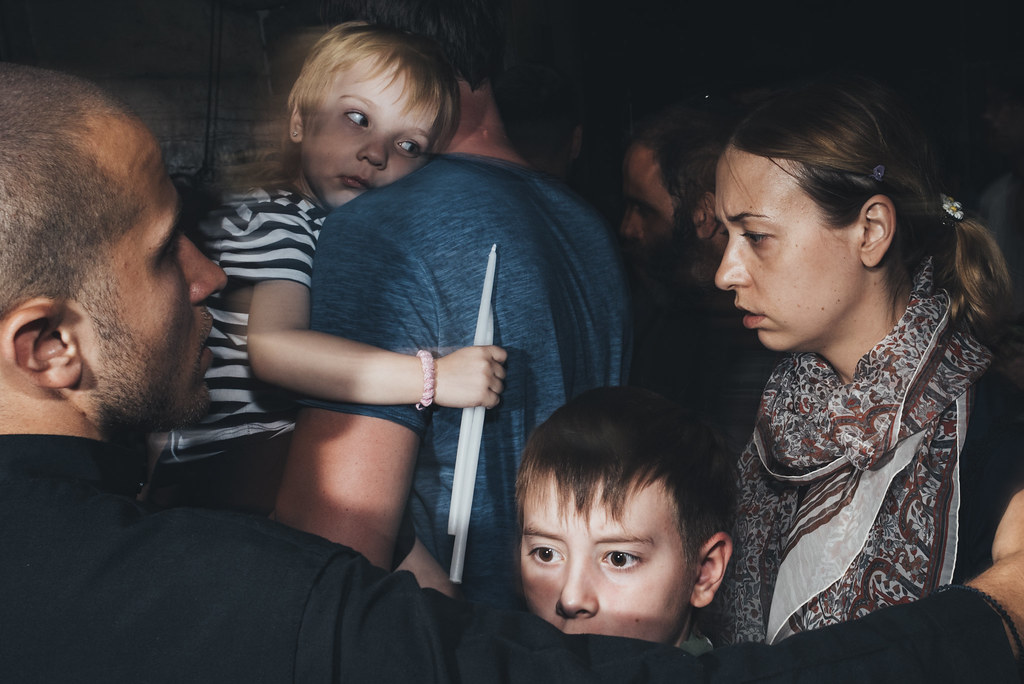
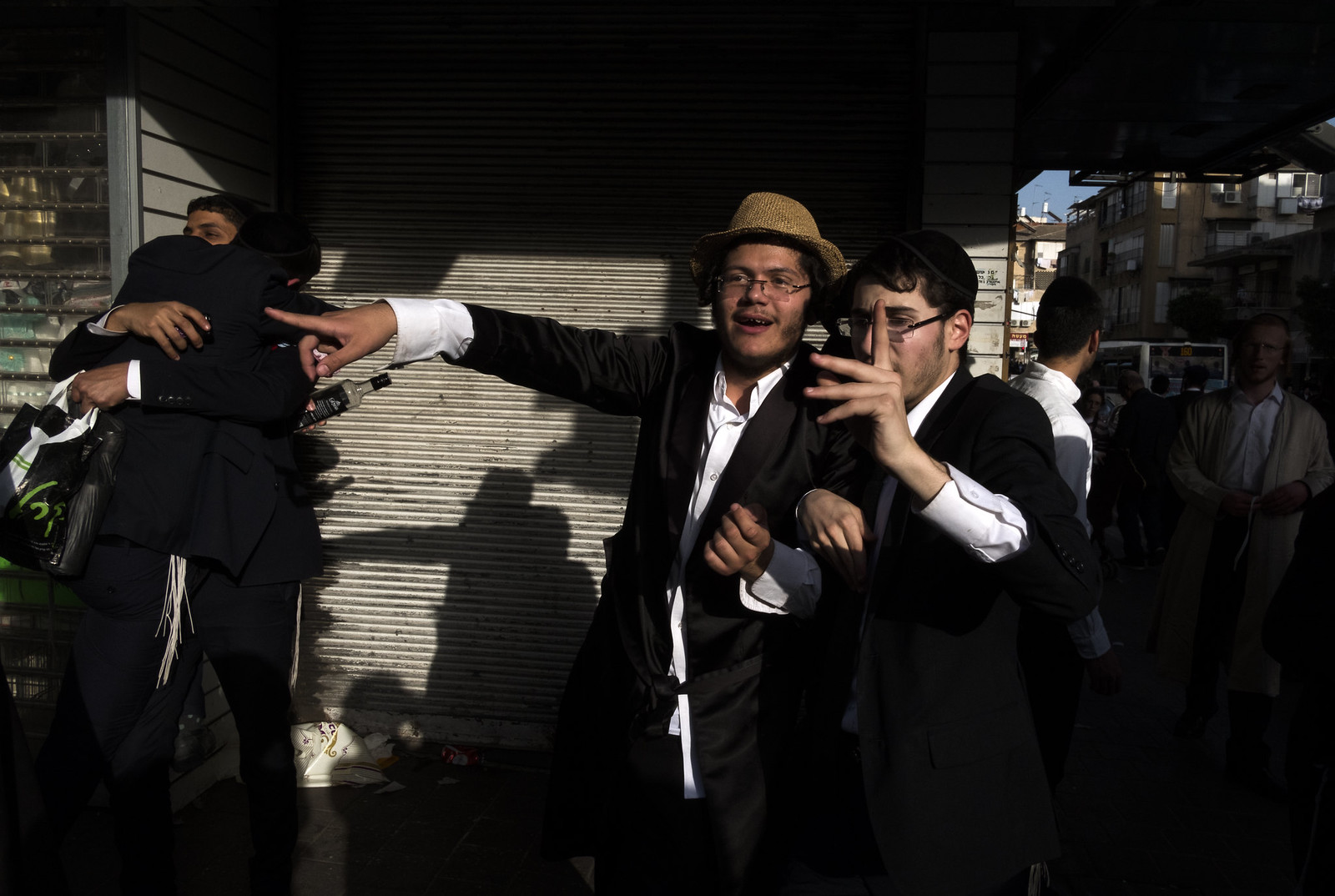
DSCF9564sofi: photo by ilan Ben yehuda, 1 March 2018

DSCF9564sofi: photo by ilan Ben yehuda, 1 March 2018

DSCF9564sofi: photo by ilan Ben yehuda, 1 March 2018
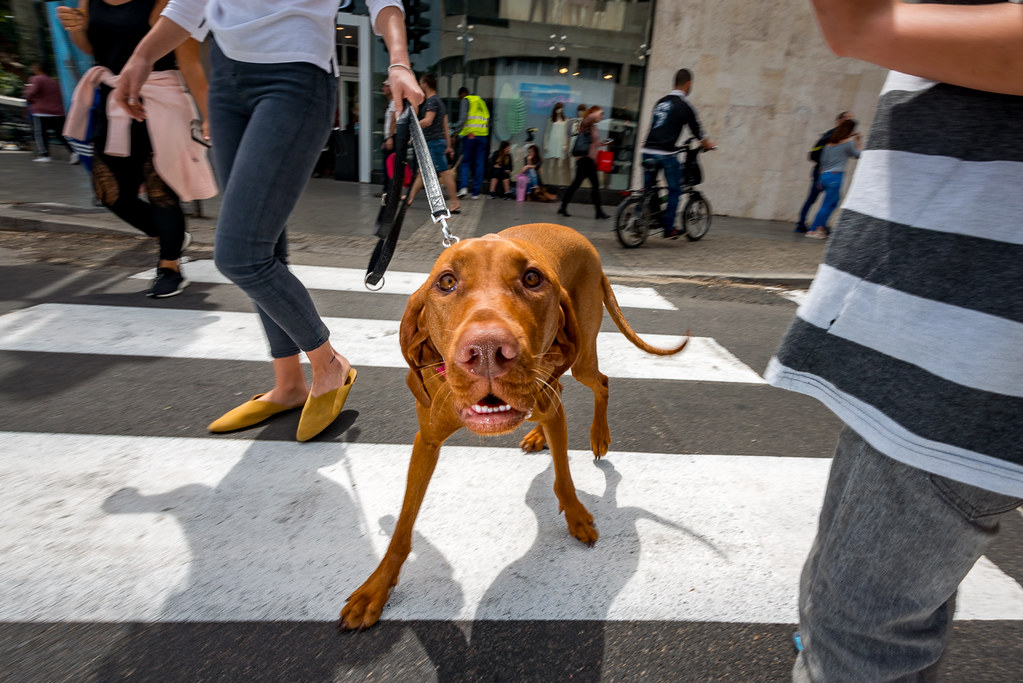
Untitled [Tel Aviv]: photo by Ilan Burla, 5 April 2018


Untitled: photo by BoRIS THE FLASH, 29 April 2016

DSCF9564sofi: photo by ilan Ben yehuda, 1 March 2018

DSCF9564sofi: photo by ilan Ben yehuda, 1 March 2018

DSCF9564sofi: photo by ilan Ben yehuda, 1 March 2018

Untitled [Tel Aviv]: photo by Ilan Burla, 5 April 2018



There is no school tomorrow. There are no children left in Gaza
ReplyDeleteDarwish is a Psalmist; each line has a searing velocity.
ReplyDeleteDuncan,
ReplyDeleteThank you for again representing, and in that act becoming, the lost voice of humanity.
This blog began in late 08/early 09 with that specific white phosphorous tinged chapter in this terrible history.
After ten years, I'm older and weaker and finding this particular "(battle)field of study" longer and harder to try to "cover" every day, night and year. It still goes on. And I'm not even there, in it.
Couldn't sleep at all last eve after another jolly session of enquiry at the "contested" (annoying antswarms v raging mad humongosaur) borderlands.
Reminding us once again it's the THEFT OF LAND which is the no longer so ulterior, more and more so obvious motive inspiring all this special attention being given by the land-thieves.
This today:
___
Lost control
"Hasbara memo: “When Israelis murder Palestinians, it’s a tragedy — for Israelis.”" (Hugus). Golda Meir:
"“We can forgive the Arabs for killing our children. We cannot forgive them for forcing us to kill their children. We will only have peace with the Arabs when they love their children more than they hate us.”"
XYMPHORA, 21 April 2018
As that last bit backs up into its source... It did occur to me some might actually be interested in the source.
ReplyDelete______
Hasbara memo: “When Israelis murder Palestinians, it’s a tragedy — for Israelis.”: Richard Hugus, Aletho News, 19 April 2018
Since the start of the latest massacre in Gaza — the killing with live fire of almost 40 and wounding of almost 3,000 unarmed Palestinian protestors during the March of Return — propaganda in service of Israel has been mobilized to cover up the blatant crime. Three days after the March began, the Jewish Community Relations Council of Greater Boston issued an unbelievably twisted statement on the attacks. What follows is their statement, with comments inserted in italics:
Jewish Community Relations Council Statement in Events Along The Gaza Border
April 2, 2018
“We see the events along the Gaza-Israel border this weekend as the continuation of one of the great tragedies of our time.”
— This implies that Gaza is a sovereign country bordering Israel, not the prison for Palestinian refugees that Israel established decades ago in the south of Palestine.
“This is a situation where many are at fault, leaving individuals in impossible situations with impossible choices.”
— When someone is morally at fault, the situation is always “complicated.” As we shall see, the “many at fault” are always Palestinians, not Israelis.
“It is a tragedy for the people of Gaza that, 12 years after the complete withdrawal of Israel from the Gaza Strip, they live under such difficult conditions.”
— “Tragedy” in Greek theater held that events are written by our fate and could not have been otherwise. If Zionism had not chosen Palestine in the late 1800’s and then proceeded to steal land from Palestinians from then on, it could very much have been otherwise. There was an actor here; there was a cause, and an effect. The cause of the “tragedy” was Zionism. Ask the settlers to return to their own countries, and the “tragedy” would end.
The sentence also implies that Israel made a noble gesture when it withdrew from Gaza, and that it is the fault of the Palestinians that they did not make the best of this generous gift. In fact, Israel left Gaza because it was more expedient for Israel to administer Gaza as a prison than to occupy it. The “difficult conditions” faced by the people of Gaza are the result of Israeli control over everything and everyone that goes into and out of it. The “difficult conditions” are the result of repeated Israeli bombings of critical infrastructure, and Israel’s clear plan for the complete immiseration of Gaza’s two million people.
“It is a tragedy for the Palestinians that Gaza was taken over by Hamas, an internationally designated terrorist organization that rules in a brutal dictatorship.”
— Hamas was democratically elected by its people because it distinguished itself from the collaborationist leadership of the Palestinian Authority. Israel defines Hamas as terrorist because Hamas is determined to resist the Zionist entity. Israel’s minions in legislative bodies in other countries have been used to create the “designated terrorist” label.
“Brutal dictatorship” is a buzzword applied to all political movements asserting independence from imperialist control.
“It is a tragedy that Hamas has chosen to direct its resources to the building of tunnels and rockets, rather than building hospitals, schools, housing, and factories that would create prosperity and opportunity for the Palestinian people.”
— Are these the same hospitals, schools, housing and factories that Israel has been bombing since 2006? Are these the same tunnels that Gazans used to bring in vital humanitarian goods not allowed through Israeli checkpoints? Doesn’t Hamas have the right to its primitive rockets when Gazans are being periodically bombarded by Israel and its highly sophisticated fighter jets?
[Hugus cont.]
ReplyDelete“It is a tragedy that, by squandering the opportunity to build a better future for the Palestinian people, Hamas has forced Israel and Egypt to secure their own borders with a blockade to prevent the further weaponization of Gaza.”
— For choosing resistance against the Zionist occupier, the Palestinian people were punished by the Zionist occupier and his servants in Egypt. The blockade is not just against weapons, it’s against any freedom of movement, and any importation of needed goods. Even people in need of urgent medical care are refused. The main purpose of the Israeli blockade is to starve Gaza, to “put them on a diet”, as one Israeli official said. To its everlasting shame, the West-installed political class in Egypt – not the Egyptian people – has chosen to collaborate.
“It is a tragedy that the Palestinian people of Gaza have no recourse against their leaders, living without elections or even the ability to protest those in power openly on pain of death.”
— Again, Hamas was democratically elected in 2006. One would think “the only democracy in the Middle East” would appreciate this. Stories of Hamas killing protesters have appeared only in the Israeli press – e.g., the Jerusalem Post, the Times of Israel. However, there are stories every day in the worldwide press of Israeli soldiers shooting Palestinian protestors all over the West Bank. Let’s also remember that the March of Return in Gaza is made up of protestors, and that Israel sent snipers there for the explicit purpose of killing and wounding them. This is not to mention the “recourse against” Hamas leaders employed over the years by Israel – namely, open assassination.
“It is a tragedy that they are deceived by their own leaders with the unrealistic promise of a destructive victory over the State of Israel – a victory that will never come. It is a tragedy that their own government chooses to use them as human shields, perpetuating their suffering for nefarious self-interest.”
— As the Borg said, “Resistance is futile.” Isn’t the promotion of the idea of an unconquerable Israel the worst kind of war propaganda? The “human shields” argument has been used by Israel as an excuse for intentionally killing hundreds of civilians during its repeated bombing campaigns. What is the “nefarious self-interest” of Gaza’s leadership? — liberation from Israeli torture.
“It is a tragedy that the Israeli people look at Gaza and see the end of a dream; to live in peace with their neighbors.”
— The “dream” of the majority of the Israeli people today is to remove Palestinians from all of historic Palestine, and completely erase Palestinian history. Israelis do not “live in peace with their neighbors.” They have repeatedly attacked Lebanon, Iraq, and Syria and they are the main instigators today of conflict and war with Iran.
“It is a tragedy that Israelis living near the border are terrorized by threats coming from tunnels under their homes and rockets over their schools.”
–The main tactic of this propaganda piece is to blame the victim. Thus, nothing was done through the agency of the Jewish state and its obvious goals; everything was done as a reaction to injustices committed by Palestinians. It also turns reality on its head. Homes and schools have indeed been destroyed, but by Israel.
“It is a tragedy that when Israelis do what any other nation in the world would do – protect their border from being overrun – that they endure a condemnation that no other nation would receive.”
— This is the “why pick on us?” argument. Why? Because Israel has the ugliest, most long-standing system of open colonization and oppression visible in the world today. The vast majority of the people of the world are disgusted. What Israel claims as its “borders” is stolen land.
[Hugus cont.]
ReplyDelete“It is a tragedy that Israelis experience this singling out as a further example of an isolation, their status as “the Jew amongst the nations,” with only themselves to protect their inalienable rights to live in security.”
— This is the “Jew as victim” argument, made possible by unrelenting Holocaust instruction since World War II, which provides a guaranteed pass for any and all crimes committed by Jews. Since 2001, Israel, the poor victim nation, has gotten the United States to attack a long list of countries in the Middle East which Israel feels threatened by, now including Russia because Russia has thrown a wrench into Israeli plans to destroy Syria. Israel also receives massive direct funding and political cover from the United Sates.
If Israel resents its status as “the Jew amongst the nations” why does it call itself “the Jewish state”? Why does it display the Star of David on all its national symbols and armaments? This is an identity which Israelis promote – how can they now turn around and blame us for it?
“It is a tragedy because this weekend, young men and women of the Israel Defense Forces stared down the sights of their rifles and learned violence at a time when they should have been at home with their families celebrating freedom at the Passover table.”
— The idea that it is the Israeli Occupation Forces who have suffered because they have had to kill and maim defenseless Palestinians is a perfect example of what Zionist supremacy and racism is. It is a form of self-worship and psychopathy in which one is never responsible for committing any wrong — it is always the fault of the other. This sentence is reminiscent of Israeli Prime Minister Golda Meir saying: “We can forgive the Arabs for killing our children. We cannot forgive them for forcing us to kill their children.” In other words, the real crime has been committed against Jews, whose purity has been sullied by having to kill innocent people (as they were invading their land and homes).
[Hugus - concludes]
ReplyDeleteThis belief of Jewish superiority above others is at the bottom of everything Palestinians have suffered for the past 70 years.
“It is a tragedy because Palestinians need some way to express their frustrations – at Israel and at their own government after years of wasted opportunities to build a better life for the people of Gaza. Instead they experienced more manipulation, and more loss.”
–No, the ” frustration” Palestinians feel is from being consistently and sadistically blocked from life and liberty by the Israeli prison-keeper. The real manipulators are those who would have us believe the oppressive tactics of Israel are of the Palestinians’ own making, as this sentence implies.
“We see this weekend as the continuation of a tragedy that has not brought the people of Israel and Gaza any closer to a future of peace and hope for all of their children. As the Boston Jewish community continues to celebrate the Passover holiday this week, we are mindful of the lessons learned at our seders, that we do not rejoice over the tragedy of others and we are ever hopeful for peace and stability for all people.”
— Again, no recognition that this “tragedy” might be in any way the fault of Israel. Israel is supported, not by “the Boston Jewish community” but by a cynically propagandistic Washington-based lobby for Israel, the Jewish Council for Public Affairs, which provides the political line for 125 supposedly local Jewish Community Relations Councils in the US. In other words, a political lobby for a country 6,000 miles away says they speak for all Jews in Boston.
In 2016 the Jewish Community Relations Council of Boston sponsored a deceptive anti-boycott bill in the Massachusetts legislature. They were successfully opposed by a large number of Jewish activists in the state, and many others. The Council now claims to represent the Jewish community of Boston in mobilizing opposition to a motion in the Cambridge city council to boycott Hewlett-Packard. When was the vote in which “the Boston Jewish community” elected this Council? Who is the real manipulator in this scenario? Doesn’t the Jewish Community Relations Council actually represent a foreign political movement — not Cambridge, not Boston, not Massachusetts?
Israel, you can’t have it both ways. You can’t repeatedly murder people in Gaza in broad daylight and then piously claim you’re for “ peace and stability for all people.”